28 Beautiful Travel Words that Describe Wanderlust Perfectly


Describe your travels with these unique and beautiful travel words from different languages around the world.
I love travelling and I love languages, so imagine my excitement when I came across a treasure trove of travel words and wanderlust synonyms that describe how we feel before, during, and after we travel.
Just like a photo can’t fully capture what it feels like to stand on the edge of a fjord , neither can ‘wanderlust’ fully express how we feel when we crave our next adventure. These travel words are literary gems which have been gathered from languages around the world. From Japanese to Swedish , Latin to Greek , travel brochures of the future will be peppered with travel words like of resfeber , livsnjutare, and coddiwomple .
Wanderlust meaning
As you’ll see in the list below, every language has its own variation of how it explains and defines what wanderlust is. In English, wanderlust means to have a strong desire for or impulse to travel, wander and explore the world.
Learn a language from home
During these times it can be bittersweet to think about travelling when we have to stay at home and practice social distancing, let this list of wanderlust-filled words inspire you to a learn a language from home and prepare yourself for your next trip. Being travel fluent is the best way to enrich your travel experiences.
Without further ado, here are 28 beautiful travel words you should slip into your vocabulary. When you’re done, take and look at this collection of inspirational travel quotes . I’d love to hear which ones are your favourites in the comment section below.
Table of Contents
- Eleutheromania
- Quaquaversal
- Schwellenangst
- Strikhedonia
- Livsnjutare
- Novaturient
- Coddiwomple
1. Resfeber (n.)
Origin: Swedish
Definition: The meaning of resfeber refers to the restless race of the traveller’s heart before the journey begins when anxiety and anticipation are tangled together.
It’s that moment just after you buy your plane tickets and excitement and fear floods in all at once, creating a mixture of emotions that make you feel anxious or physically ill.

For more inspiration, don’t miss my guide to cool gifts for language learners and the best travel accessories and travel gadgets here.
2. Sonder (v.)
Origin: Unknown
Definition: The realisation that each passerby is living a life as complex as your own.
The full definition, taken from The Dictionary of Obscure Sorrows reads:
[Sonder is] the realization that each random passerby is living a life as vivid and complex as your own—populated with their own ambitions, friends, routines, worries, and inherited craziness—an epic story that continues invisibly around you like an anthill sprawling deep underground, with elaborate passageways to thousands of other lives that you’ll never know existed, in which you might appear only once, as an extra sipping coffee in the background, as a blur of traffic passing on the highway, as a lighted window at dusk.
I often feel this way when I pass groups of strangers, speaking a language that is completely foreign to me, and realise just how incredibly big the world is. We all have a life that is full of different connections, memories and possibilities. That’s sonder.
The internet suggests this may not be a real word, either way, the concept is beautiful.
3. Solivagant (adj.)
Origin: Latin
Definition: Wandering alone. A solitary adventurer who travels or wanders the globe.
Not all those who wander are lost, but all those who wander alone are definitely solivagants . From the Latin word solivagus , meaning lonely or solitary, solivagant describes anyone who enjoys meandering around new countries, alone, in order to take it all in.
4. Fernweh (n.)
Origin: German
Definition: This German word,means an ache to get away and travel to a distant place, a feeling even stronger than wanderlust. If wanderlust wasn’t poetic enough for you, allow me to present fernweh , a German word that literally translates to “distance-sickness.”
While someone with wanderlust might sit at home and happily fantasise about all the places they might visit, someone with fernweh would feel a deeper sense of longing, a sort of homesickness but for foreign lands. For me, it’s wanting to be back in Rome . Fernweh is one of most those beautiful untranslatable words I’ve ever come across.
Carry this beautiful word with you with my Fernweh T-Shirt available in men’s and ladies styles and black or white. Buy it here.

5. Sehnsucht (n.)
Definition: A wistful longing and yearning in the heart for travels past and future.
One author translated it as the “ inconsolable longing in the human heart for we know not what .” Another compared it to “ a longing for a far-off country, but not one which we could identify.”
When you return from travelling and wish you could do it all over again and experience every moment like it was the first.
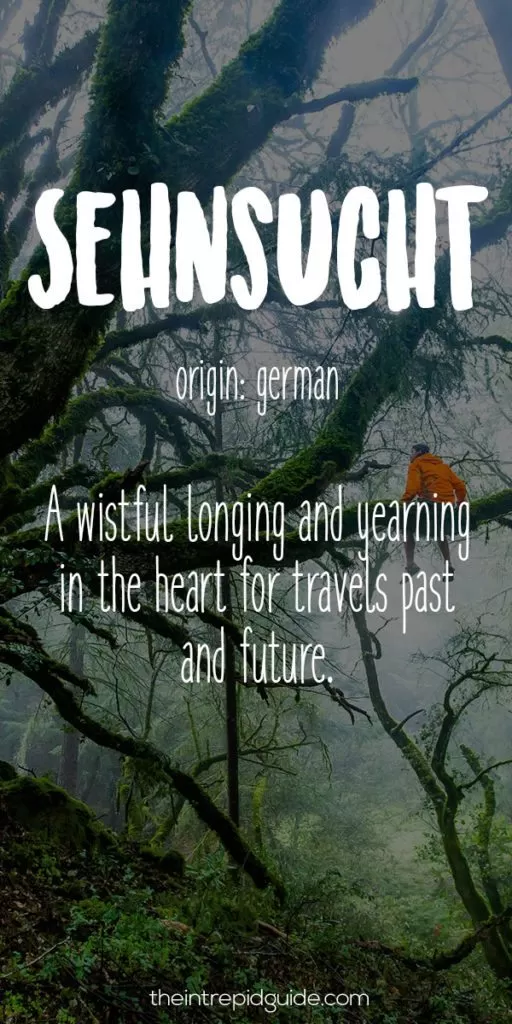
6. Eleutheromania (n.)
Origin: Greek
Definition: An intense and irresistible desire for freedom.
We all want to be free, and travelling shows us how the freedom in the lives of others that is different from our own. Eleutheromania describes a person who has a strong desire and obsession for freedom.
7. Cockaigne (n.)
Origin: French , Middle French
Definition: An imaginary land of luxury and idleness.
Every destination seem like a wonderland or cockaigne before you set foot there and see it for yourself.
The term c ockaigne ” comes from the Middle French phrase pais de cocaigne, which literally means “the land of plenty.” The word was first popularised in a 13th-century French poem that is known in English as “The Land of Cockaigne.”
8. Quaquaversal (adj.)
Definition: Moving or happening in every direction instantaneously.
This perfectly describes my state when I’m in a new place and want to see and do everything at once.
9. Dérive (n)
Origin: French
Definition: A spontaneous and unplanned journey where the traveller leaves their life behind allows themselves to be guided by the landscape and architecture.
Literally translated as “drift”, dérive is the idea that even if you drift you will end up on the right path. This could describe life in general, but it also describes small journeys. When you’re wandering through a new city and you just happen to wander on a path that takes you to great discoveries.
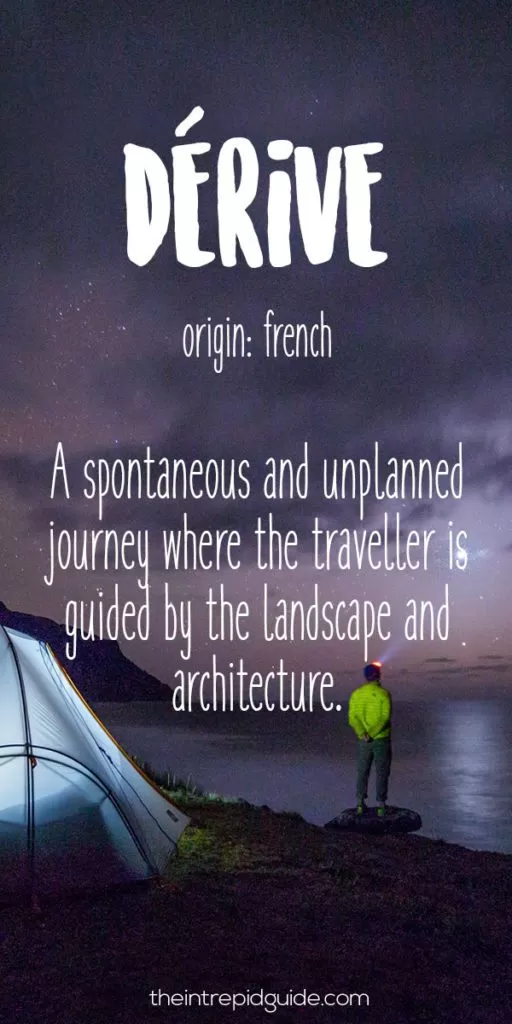
10. Ecophobia (n.)
Origin: English
Definition: This word came into English word via Greek and means a fear or dislike of one’s home.
I don’t dislike my home, but recently I can’t stop thinking about going back to Lofoten, Norway.
11. Numinous (adj.)
Definition: A powerful feeling of both fear and fascination, of being in awe and overwhelmed by what is before you.
Originally, this word refers to having a strong religious or spiritual quality; but it can also be used to describe how you feel when you see things that are so beautiful that you realise how wonderful the world is and the small part you play in it. Hiking Trolltunga was a numinous moment for me.
12. Schwellenangst (n.)
Definition: Fear of crossing a threshold to begin a new chapter.
From s chwelle (“threshold”) and a ngst (“anxiety”), this word explains that feeling you get before deciding to set out on a new journey. Argh! Did I make the right decision?
13. Strikhedonia (n.)
Definition: The pleasure of being able to say “to hell with it”.
Another personal favourite word on this list. Not only is it the joy I feel, but the freedom to be able to say “to hell with it” and book that next trip and embark on your next adventure.
14. Vagary (v.)
Definition: A whimsical or roaming journey.
From Latin, vagārī meaning “ to roam”, is an unpredictable idea, desire or action to travelling without knowing the destination, and not caring.
15. Livsnjutare (n)
Definition: Literally meaning, “enjoyer of life”, this describes a person who loves life deeply and lives it to the extreme.
If you’re reading this, that’s probably you! Need more inspiration?
16. Commuovere (v.)
Origin: Italian
Definition: To stir, to touch, to move to tears.
Just like the euphoric emotions I felt whilst whale watching.
17. Sturmfrei (adj.)
Definition: The freedom of being alone and being able to do what you want.
Literally translating to “stormfree”, this describes the freedom of not being watched by others and being alone in a place where you have the freedom and ability to do what you want.
Another great German word. Travelling solo can be especially rewarding because you have complete control. No compromises, no one else to please. Just you and the big wide world.
18. Saudade (n.)
Origin: Portuguese
Definition: This Portuguese word describes the emotional state of nostalgia and longing for someone or something distant. S audade was once described as “the love that remains” after someone is gone.
Saudade is the recollection of feelings, experiences, places, or events that brought excitement and happiness but now triggers the senses and makes one live again.
19. Yūgen (n.)
Origin: Japanese
Definition: A profound and mysterious sense of the beauty of the universe.
An awareness of the Universe that triggers emotional responses too deep and powerful for words.
20. Acatalepsy (n.)
Definition: The impossibility of comprehending the universe.
Henry Miller said “ One’s destination is never a place, but a new way of seeing things. ” Do we ever really understand the world and what we see on our travels, and how they mould us? Sometimes, if at all, it takes time to discover how these things change our lives.
21. Trouvaille (n.)
Definition: A chance encounter with something wonderful.
Whether it’s stumbling across a hidden back street, a quaint cafe, or connecting with a local, trouvaille describes those magical moments we experience in our journeys.
22. Hygge (n.)
Origin: Danish
Definition: Pronounced hue-guh , hygge describes the warm feeling you get while enjoying the company of great friends and all life has to offer.
Hygge is the conscious appreciation of recognising everything you have and enjoying to the present moment.
23. Onism (n.)
Definition: The world is a big place as not everyone will get to see it. Onism describes understanding that we’ll never get to see it all. It’s the frustration of being stuck in just one body that can only inhabit one place at a time. I felt this way before going to Copenhagen !
Similar to the Swedish word ‘resfeber’, onism describes the feeling of knowing that you’ll never be able to see it all. They say that the more you travel, the harder it gets to stay in one place.
24. Novaturient (adj.)
Definition: A desire to change and alter your life.
This was exactly how I felt when I quit my job and moved to Rome . There was this strong urge that pulled me towards my dream of pursuing a life of speaking Italian and travelling. I knew I wouldn’t be living my life if I didn’t go.
25. Yoko meshi (n.)
Definition: This untranslatable gem describes the stress of speaking a foreign language .
The Japanese word ‘meshi’ literally means ‘boiled rice’ and ‘yoko’ means ‘horizontal,’ together it means ‘a meal eaten sideways.’ The Japanese have created a beautiful way of describing the unique kind of stress you experience when speaking a foreign language. Furthermore, ‘yoko’ also references the fact that Japanese is normally written vertically, whereas most foreign languages are written horizontally. Clever, right?
Related: 69 Wonderful Japanese Expressions That Will Brighten Your Day
26. Selcouth (adj.)
Origin: Old English
Definition: When everything you see and experience is unfamiliar and strange, yet you find it marvellous anyway.
It’s that feeling you get when you travel to a foreign land and food, culture, customs, or language, is strange and different to everything you’ve experienced before, yet you love it and find it fascinating.
27. Eudaimonia (n.)
Definition: A state of being happy whilst travelling and everything feels great.
That intense excitement and appreciation when you travel and everything feels great. Seeing the Northern Lights was one of the best experiences of my life, a feeling I won’t forget.
28. Coddiwomple (v.)
Origin: English slang
Definition: To travel purposefully towards an unknown destination.
A brilliant word, coddiwomple is when you have a vague idea of your destination within a care for how long it takes to arrive. A great example is when you go hiking, you know you’ll eventually reach the summit, but every part of the trail along the way is just as beautiful. Like the time I hiked Norway’s Trolltunga.

If you enjoyed these words, then let wordsmiths Stephen King, Mark Twain and the Dalai Lama transport you around the world with these inspirational travel quotes or start using some of the beautiful untranslatable words from other languages.
Want to know more about learning languages? Start here!
- 18 Unexpected Advantages & Health Benefits of Learning A Foreign Language
- The World’s Most Beautiful Untranslatable Words from Around the World: The Ultimate List A-Z
- 13 Ways to Seamlessly Integrate Language Learning into Your Daily Life
- What Type of Language Learner Are You? Your 4-Step Personalised Learning Plan
- 15 Top Language Learning Resources You Should Use
- 7 Reasons Why You Should Go on a Language Holiday
- 11 Life-Changing Reasons Why You Should Learn a Language
- How to Learn Your First Foreign Language in 8 Simple Steps: A Beginner’s Guide
- 42 beautiful Inspirational Quotes for Language Learners
- Language learning tips: 11 Polyglots Reveal The Secrets of Their Success
- Top 10 Best Ways to Learn a Language Better and Faster
- How to Learn Italian Before Your Trip
- Free Travel Phrase Guides
- How a ‘Potato’ improved my French Pronunciation
- How Many Languages are there in the World?
- Hilarious Idiomatic Expressions that Will Brighten Your Day
- 78 FREE Dictionaries to Learn a Language Fast [Free eBook Download]
- 22 KEY Travel Phrases That Will Transform Your Travels [Free Guide]
Over to you!
Which one of these travel words do you identify with the most? What others would you add? Let me know using the comments section below or join me on social media to start a conversation.
Thanks for reading and I hope you enjoyed this post.
Like what you see? Subscribe using the form below to have all of my posts delivered directly to your email.
Success! Now check your email to confirm your subscription.
There was an error submitting your subscription. Please try again.
Get my best language and travel tips FREE by email...
Subscribe to my newsletter to receive detailed travel guides, exclusive travel and language learning tips, priority access to giveaways and more!
I will never give away, trade or sell your email address. You can unsubscribe at any time.
Michele creates language learning guides and courses for travel. What separates her from other instructors is her ability to explain complex grammar in a no-nonsense, straightforward manner using her unique 80/20 method. Get her free guide 9 reasons you’re not fluent…YET & how to fix it! Planning a trip? Learn the local language with her 80/20 method for less than the cost of eating at a tourist trap restaurant Start learning today!
Italian Cognates & Loanwords: 17 Rules to Italianizing English Words You Already Know
124 inspirational travel quotes that’ll make you want to travel in 2022, 12 comments.
Amazing list! One word I’d add is the Dutch word “gezellig” or “gezelligheid” – similarly to hygge, it describes a feeling of warmth/comfort/coziness/quaintness in certain settings or around certain people.
Thank you so much for sharing this Heba. So interesting to learn that Dutch has a similar word 🙂
This is such a fun article! Love these words and phrases!
Glad to hear it! Thank you so much, Eric 🙂
So many of these describe me or my feelings about seeing the world. But, if I had to pick one, the one that best describes how I choose my destinations would be “selcouth”. I so want to be a stranger in a strange land. To have my belief that there is no such thing as “normal” affirmed again and again and over again.
What a beautiful word. Thanks for sharing, Janet 🙂
Thanks Michele what a wonderful list of inspirational words. It nearly made me cry as I realised that I suffer from acute eleutheromania! ha
Thanks Juliana 🙂 I’m so glad you enjoyed this list. Eleutheromania? I know how you feel hehe
Unique list i must say – If you want to add one more word than check this !
In Hindi language (India) traveler called as “Musafir”
thanks Niraj 🙂
Thanks for sharing this! Really enjoyed it a lot ❤
Thanks Donah, I’m so glad you enjoyed it 😉
Leave a Comment Cancel Reply
Save my name, email, and website in this browser for the next time I comment.
This site uses Akismet to reduce spam. Learn how your comment data is processed .

If you don't know where you are , how do you know where you're going? Find out how well you know Italian grammar today!

English Guide
Help center
solivagant Definition
- 1 wandering alone
- 2 rambling alone
Using solivagant: Examples
Take a moment to familiarize yourself with how "solivagant" can be used in various situations through the following examples!
The solivagant traveler enjoyed the peace and quiet of the forest.
She was a solivagant soul, preferring to spend her time alone in nature.
The solivagant artist found inspiration in the solitude of the countryside.
solivagant Synonyms and Antonyms
Synonyms for solivagant, antonyms for solivagant.
- accompanied
Phrases with solivagant
Solivagant lifestyle.
a way of life that involves wandering alone, often without a permanent home or job
He left his old life behind and embraced a solivagant lifestyle, traveling the world with nothing but a backpack.
solivagant journey
a long and solitary trip, often taken for personal growth or spiritual reasons
After her divorce, she embarked on a solivagant journey across the country to find herself.
solivagant habits
behaviors or routines that are typical of someone who wanders alone
His solivagant habits included sleeping under the stars and cooking meals over an open fire.
Origins of solivagant
from Latin 'solus', meaning 'alone' + 'vagari', meaning 'to wander'
Summary: solivagant in Brief
'Solivagant' [sol-iv-uh-guhnt] is an adjective that describes someone who wanders alone or rambles alone. It can be used to describe a person's lifestyle, journey, or habits. Synonyms include 'solitary', 'lonely', and 'isolated'. Antonyms include 'accompanied', 'together', and 'grouped'.

It’s normal for your mind to wander. Here’s how to maximise the benefits
Psychology researcher, Bond University
Associate Professor in Psychology, Bond University
Disclosure statement
The authors do not work for, consult, own shares in or receive funding from any company or organisation that would benefit from this article, and have disclosed no relevant affiliations beyond their academic appointment.
Bond University provides funding as a member of The Conversation AU.
View all partners
Have you ever found yourself thinking about loved ones during a boring meeting? Or going over the plot of a movie you recently watched during a drive to the supermarket?
This is the cognitive phenomenon known as “ mind wandering ”. Research suggests it can account for up to 50% of our waking cognition (our mental processes when awake) in both western and non-western societies .
So what can help make this time productive and beneficial?
Mind wandering is not daydreaming
Mind wandering is often used interchangeably with daydreaming. They are both considered types of inattention but are not the same thing.
Mind wandering is related to a primary task, such as reading a book, listening to a lecture, or attending a meeting. The mind withdraws from that task and focuses on internally generated, unrelated thoughts.
On the other hand, daydreaming does not involve a primary, active task. For example, daydreaming would be thinking about an ex-partner while travelling on a bus and gazing out the window. Or lying in bed and thinking about what it might be like to go on a holiday overseas.
If you were driving the bus or making the bed and your thoughts diverted from the primary task, this would be classed as mind wandering.

The benefits of mind wandering
Mind wandering is believed to play an important role in generating new ideas , conclusions or insights (also known as “aha! moments”). This is because it can give your mind a break and free it up to think more creatively.
This type of creativity does not always have to be related to creative pursuits (such as writing a song or making an artwork). It could include a new way to approach a university or school assignment or a project at work. Another benefit of mind wandering is relief from boredom, providing the opportunity to mentally retreat from a monotonous task.
For example, someone who does not enjoy washing dishes could think about their upcoming weekend plans while doing the chore. In this instance, mind wandering assists in “passing the time” during an uninteresting task.
Mind wandering also tends to be future-oriented. This can provide an opportunity to reflect upon and plan future goals, big or small. For example, what steps do I need to take to get a job after graduation? Or, what am I going to make for dinner tomorrow?

Read more: Alpha, beta, theta: what are brain states and brain waves? And can we control them?
What are the risks?
Mind wandering is not always beneficial, however. It can mean you miss out on crucial information. For example, there could be disruptions in learning if a student engages in mind wandering during a lesson that covers exam details. Or an important building block for learning.
Some tasks also require a lot of concentration in order to be safe. If you’re thinking about a recent argument with a partner while driving, you run the risk of having an accident.
That being said, it can be more difficult for some people to control their mind wandering. For example, mind wandering is more prevalent in people with ADHD.
Read more: How your brain decides what to think
What can you do to maximise the benefits?
There are several things you can do to maximise the benefits of mind wandering.
- be aware : awareness of mind wandering allows you to take note of and make use of any productive thoughts. Alternatively, if it is not a good time to mind wander it can help bring your attention back to the task at hand

context matters : try to keep mind wandering to non-demanding tasks rather than demanding tasks. Otherwise, mind wandering could be unproductive or unsafe. For example, try think about that big presentation during a car wash rather than when driving to and from the car wash
content matters : if possible, try to keep the content positive. Research has found , keeping your thoughts more positive, specific and concrete (and less about “you”), is associated with better wellbeing. For example, thinking about tasks to meet upcoming work deadlines could be more productive than ruminating about how you felt stressed or failed to meet past deadlines.
- Consciousness
- Daydreaming
- Concentration
- Mind wandering

Senior Lecturer - Earth System Science

Operations Coordinator

Sydney Horizon Educators (Identified)

Deputy Social Media Producer

Associate Professor, Occupational Therapy
- Cambridge Dictionary +Plus
Meaning of wandering in English
Your browser doesn't support HTML5 audio
wander verb ( MOVE AROUND )
- walk The baby has just learned to walk.
- stride She strode purposefully up to the desk and demanded to speak to the manager.
- march He marched right in to the office and demanded to see the governor.
- stroll We strolled along the beach.
- wander She wandered from room to room, not sure of what she was looking for.
- amble She ambled down the street, looking in shop windows.
- crawl There'd been a bad accident on the motorway and traffic was crawling.
- trundle Lorries trundle through the narrow lanes.
- creep He crept downstairs, hardly making any noise.
- trudge They trudged wearily through the snow.
- stroll We spent the afternoon strolling around Budapest.
- amble He ambled over to the window.
- Don't worry if you lose hold of the reins - the horse won't wander off.
- He wandered around, clearing up in a desultory way.
- We wandered along the shore , stepping over the flotsam that had washed up in the night .
- We wandered through the beautifully proportioned rooms of the Winter Palace.
- She was wandering around in a daze this morning .
- His eyes wandered over the posters adorning the walls .
- dumbwalking
You can also find related words, phrases, and synonyms in the topics:
wander verb ( SUBJECT )
- bury the lede idiom
- candy coating
- candy-coated
- circumlocution
- circumlocutory
- gloss over something
- go off on a tangent idiom
- mealy-mouthed
- prevaricate
- unexpressed
Related word
Examples of wandering.
In English, many past and present participles of verbs can be used as adjectives. Some of these examples may show the adjective use.

Word of the Day
the act of an animal running around, sometimes in circles, in a very energetic way

Binding, nailing, and gluing: talking about fastening things together

Learn more with +Plus
- Recent and Recommended {{#preferredDictionaries}} {{name}} {{/preferredDictionaries}}
- Definitions Clear explanations of natural written and spoken English English Learner’s Dictionary Essential British English Essential American English
- Grammar and thesaurus Usage explanations of natural written and spoken English Grammar Thesaurus
- Pronunciation British and American pronunciations with audio English Pronunciation
- English–Chinese (Simplified) Chinese (Simplified)–English
- English–Chinese (Traditional) Chinese (Traditional)–English
- English–Dutch Dutch–English
- English–French French–English
- English–German German–English
- English–Indonesian Indonesian–English
- English–Italian Italian–English
- English–Japanese Japanese–English
- English–Norwegian Norwegian–English
- English–Polish Polish–English
- English–Portuguese Portuguese–English
- English–Spanish Spanish–English
- English–Swedish Swedish–English
- Dictionary +Plus Word Lists
- wander (MOVE AROUND)
- wander (SUBJECT)
- All translations
Add wandering to one of your lists below, or create a new one.
{{message}}
Something went wrong.
There was a problem sending your report.
- Daily Crossword
- Word Puzzle
- Word Finder
Word of the Day
- Synonym of the Day
- Word of the Year
- Language stories
- All featured
- Gender and sexuality
- All pop culture
- Grammar Coach ™
- Writing hub
- Grammar essentials
- Commonly confused
- All writing tips
- Pop culture
- Writing tips
Advertisement
[ won -der-ing ]
Crowds of wandering tourists crossed the square.
They were historically a wandering people, moving seasonally through the area.
They followed a wandering path down the mountain.
For our honeymoon we had a period of delightful wandering through Italy.
Her wanderings took her all over the world.
mental wanderings;
the wanderings of delirium.
Wandering by Alzheimer’s patients is a problem in nursing homes.
Discover More
Other words from.
- wan·der·ing·ly adverb
- wan·der·ing·ness noun
- un·wan·der·ing adjective
- un·wan·der·ing·ly adverb
Word History and Origins
Origin of wandering 1
Example Sentences
Later, information emerged that this sea lion is known for its wanderings.
This is counter-intuitive because spontaneous fluctuations and mind-wandering can also lead to depressive rumination and anxiety.
Similar to playing and dreaming is the wandering of our minds.
When psychologists do that, they find that mind-wandering is staggeringly frequent.
Mind-wandering is often considered a harmless quirk, as in the cliché of the scatter-brained professor.
Mr. Bachner found it by wandering through the market and identified a craftsmen here who works in a tiny booth.
And, in a gratuitous show of homicidal prowess, Moses kills two assassins he meets while wandering in the desert of Sinai.
After wandering at haphazard some little way I met a peasant in a sleigh.
He showed signs of a restless, wandering soul, someone searching for meaning around him.
I spotted American students wandering around London last week dressed in Stars and Stripes shorts and bikini tops.
She observed his pale looks, and the distracted wandering of his eyes; but she would not notice either.
This mode of learning promotes attention and prevents mind-wandering.
He paled a little, and sucked his lip, his eyes wandering to the girl, who stood in stolid inapprehension of what was being said.
John and Judas became the good and evil Wandering Jews of mediæval folklore.
He was relieved to learn that his grandson Moses Mole was not wandering about the garden, after all.
Related Words
[ ak -s uh -lot-l ]
Start each day with the Word of the Day in your inbox!
By clicking "Sign Up", you are accepting Dictionary.com Terms & Conditions and Privacy Policies.
Solivagant: To Wander Alone
Solivagant is a word that can refer to a "lone wanderer" or "someone who wanders on their own." A beautiful word with a tinge of loneliness at first glance. After all, why would anyone choose to travel all alone? To forego company during trips can mean trouble for the uninitiated but for others, it's part of the journey to self-reflection.

Going on trips with family and friends is almost always fun. You can share the experience with the people who are closest to you. You get to enjoy new cuisines and visit places you've only seen on TV or in magazines before. Travel photos are also not complete without group pictures. They are a great way to commemorate the fun times you've had and are a delight to stumble upon years after.

However, there is also a special kind of fulfillment you can find when you travel alone. You have all the time in the world to do things you want to do. Your itinerary is dictated by your heart and not by your schedule. Peace and quiet are your company. No unnecessary noise, it's just you with your thoughts while you continue with your journey.
When you look at it that way, traveling alone doesn't seem terrible. Perhaps, it can be a way for you to relieve that pressure that often comes with planning and going on trips. Everything is easygoing and laid back. No worries hanging over you like a dreaded deadline.

That's exactly the vibe we are getting from these travel snaps from our community members. The people in the photos are alone but far from lonely. The photos they take are deliberate and not just taken by accident. We love the contagious sense of freedom that is emanating from the scenes. The views alone are delightful to see but it's really the emotion behind the shots that can make you want to give wandering alone a shot.
How about you? Have you ever gone on a trip alone? Share your stories down in the comments section below.
written by cheeo on 2022-12-08 #culture #places #travel #gallery #analogue-photography #latin #film-photography #solivagant #to-wander-alone
rqlevy , fotofreundin , ejitsu , roaringtree , gakurou , angelobrandesphoto , klawe , polaroidlove , lomodesbro , frenchyfyl , papa-attila , birgitbuchart & rik041 .

Some beautiful shots! I especially love the sand dune and the pigeons, thank you.

To be honest photography is best enjoyed alone unless the people you are with are also photographers or enjoy being photographed. Some people just want to take a quick snap with their iPhone and move on quickly to the next hotspot.
More Interesting Articles
Lost and found film with chris fletcher.

After finding these long lost slides from the 1950s and 60s in a thrift store, British Lomographer Chris Fletcher decided to track down the man who took them all those years ago. In this interview he tells us the story of this mystery photographer.
Community Gallery: Star Trails on Film

Heavenly bodies make heavenly images on film! In this community gallery, we're taking a look at a few star trail photos taken by our community members and appreciating the challenges and rewarding nature of astrophotography.
Tipster: Film Photo Inspirations For Summer

The sun's out and so should our film cameras be! In this article we've listed a few fun, classic and experimental photo styles to give you inspiration for your summer shenanigans with the help of our creative community members.
Bundle Up and Save!

On the look for a great deal? In need for the perfect gift? Not sure what film to get with your camera? Worry not and discover our budget friendly bundles including sweet discounts and freebies for many different products! Don´t miss a great deal and check them out now!
Get it in our Shop

Purposeful Thoughts and Personal Touches: Mia Amphlett’s Tips on Instant Photography

When we're hyper fixated on producing one picture after another, we can be faced with creative burnout. Luckily experimental instant photographer Mia Amphlett is here to share her tips on finding inspiration and meaning in one's works. Consider this a sign to remember why you do what you do!
Bryan Berryeater on Creating Beauty in the Mundane with the Diana F+

Bryan Berryeater set out on a few bike rides around Portland, Oregon, accompanied by the Diana F+, along with some rolls of Lomography Color Negative 400, and Berlin Kino film. He joins us on Lomography Magazine to share his impressions and creative experimentations with the unique camera!
Synesthesia #13: Imagined Album Covers on Instant Film

For this edition of Synesthesia, we highlight the community's instant photos with music selections including Asian Indie Rock, 80s Synth Pop, introspective jazz and world music hits.
Your Quick Guide to Analogue Photography
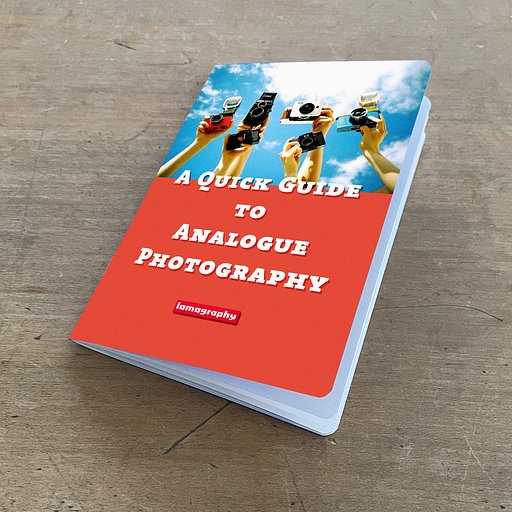
Don’t know your 35 mm from your 110? Never heard of medium format? Confused about cross-processing? This guide gives a brief overview of everything analogue and you’ll be an expert in no time! Get a head start with film photography with our downloadable 12-page PDF guide.
CARRTOONS on Discovering Analogue Photography and Documenting his NPR Tiny Desk Performance with the Lomo'Instant Camera

Ben Carr, also known as CARRTOONS, talks with us about finding inspiration in the lo-fi aesthetic, and his experience documenting his NPR Tiny Desk performance with the Lomo'Instant Automat Glass camera.
Justino Blake’s Views From Lombok With Lomography Redscale Film

In this interview we catch up with film photographer and perpetual traveler Justino Blake and he shares with us his atmospheric Lombok landscapes shot on Lomography Redscale film.
Finnish Photographer and Youtuber Ari Jaaksi Tests Our Lomomatic 110 Camera

We sent our new Lomomatic 110 to Finland-based photographer and YouTuber Ari Jaaksi, who is here today to showcase his results and experiences! He created an honest review of the camera for his YouTube channel and shares his first 110 film shots with us.
Three Lenses in One – Nour Triplet v 2.0/64 Bokeh Control Art Lens

Ignite the legacy of a fascinating but forgotten scientist, Ibn al-Haytham, and become a master of light with this unique lens designed for spherical aberration control on full-frame mirrorless cameras. Shipping Live Now!
Capturing Women's Football on Film with Raiyan Rafiq and Harriet Duffy

Raiyan and Harriet showcase their love for the beautiful game with their intimate and emotional snapshots of women's football on film, documenting scenes from the Euros, World Cup and Barclays Women’s Super League.
Making a Moment: Book Labyrinth by @pmonroe

In this edition of Making a Moment, Lomographer @pmonroe shares one of the first photos he ever uploaded to his LomoHome, which he took while exploring an old bookshop in Busan.
Magda Kuca and Laertis Create a Trippy Music Video With the LomoKino

UK-based visual artist Magda Kuca used the Lomokino to create this fantastic music video for musician Laertis, inspired by an infamous LSD-fuelled bike ride taken by Albert Hofmann in 1943.
Find Out More About


Example sentences wander alone
The word spread among cowboys and came to apply to unbranded calves found wandering alone.
After having wandered alone for time, he appeared among the people.
Opal wanders alone through a huge auto scrapyard making free-form poetic speeches about the cars into her tape recorder.
She wandered alone until the day her powers awakened.
He wanders alone in rural or urban settings feeling variously fearful or angry, lonely or trapped.
Definition of 'alone' alone

Definition of 'wander' wander

Related word partners wander alone
Browse alphabetically wander alone.
- wander aimlessly
- wander alone
- wander an aisle
- wander freely
- All ENGLISH words that begin with 'W'
Quick word challenge
Quiz Review
Score: 0 / 5
Wordle Helper

Scrabble Tools

Want to create or adapt books like this? Learn more about how Pressbooks supports open publishing practices.
15 “I Wandered Lonely as a Cloud” by William Wordsworth (Regular Verse)

William Wordsworth was born on April 7, 1770, at Cockermouth in Cumbria in northeast England, near the Lake District, whose natural beauty would inspire many of Wordsworth’s poems. His mother died when he was just 8 and his father, a lawyer, died when Wordsworth was 13. The five Wordsworth children were scattered and spent their childhood with different relatives.
Wordsworth attended Cambridge University from 1787 to 1791. He studied French, and after he graduated, he went to France to gain fluency in the language. In Blois, he met Annette Vallon, whom he hoped to marry. They had a daughter, Caroline. Short of money, Wordsworth returned to England, planning to return to France as soon as he was able. But in the wake of the French Revolution, which Wordsworth ardently supported, and the subsequent leadership of Napoleon, England and France were at war. Wordsworth could not return and would not for many years.
In 1795, Wordsworth received a legacy from a close relative, and he and his sister Dorothy went to live in Dorset. Two years later they moved again, this time to Somerset, to live near Wordsworth’s dear friend and collaborator Samuel Taylor Coleridge. Together, they produced a collection of poems, Lyrical Ballads , published in 1798. It would prove to be a milestone in the history of English poetry, one of the books that ushered in the Romantic movement (from 1800 to 1850, approximately). Coleridge’s “The Rime of the Ancient Mariner” and Wordsworth’s “Tintern Abbey” are among the most famous poems in this collection.
With sufficient independent means, Wordsworth settled in to the life of a poet, gaining fame and recognition for his work over the years, culminating in 1842, when he was named England’s poet laureate. “Ode: Intimations of Immortality” and the autobiographical The Prelude are among his more famous long poems. He also wrote scores of much-loved short lyric poems and sonnets.
Wordsworth’s personal life was filled with joy and sorrow. In 1802, he married his childhood friend Mary Hutchinson and they settled into Dove Cottage in Grasmere in the Lake District and raised a happy family, which included the beloved aunt Dorothy. Unfortunately, over the years, he feuded with Coleridge, three of his children died, one of his brothers, a ship’s captain, was drowned at sea, and Dorothy suffered a mental breakdown. He was no longer the idealistic, radical young poet who supported the cries for social justice that sparked the French Revolution. His political views evolved, becoming increasingly conservative. He died on April 23, 1850.
I Wandered Lonely as a Cloud
I wandered lonely as a cloud That floats on high o’er vales and hills, When all at once I saw a crowd, A host, of golden daffodils; Beside the lake, beneath the trees, Fluttering and dancing in the breeze.
Continuous as the stars that shine And twinkle on the milky way, They stretched in never-ending line Along the margin of a bay: Ten thousand saw I at a glance, Tossing their heads in sprightly dance.
The waves beside them danced; but they Out-did the sparkling waves in glee: A poet could not but be gay, In such a jocund company: I gazed—and gazed—but little thought What wealth the show to me had brought:
For oft, when on my couch I lie In vacant or in pensive mood, They flash upon that inward eye Which is the bliss of solitude; And then my heart with pleasure fills, And dances with the daffodils.
What is the theme of this poem? The poet describes his appreciation—indeed, his awe—of nature’s beauty. Out on a walk one day, he sees a field of golden daffodils, seeming to stretch in a “never-ending line.” Here is a widely shared human experience, a common theme among poets. We have all been overwhelmed by nature’s beauty at some point in our lives. But note that Wordsworth takes the theme one step further. Experiences as significant as the one described in the poem have staying power. Days, month, years later, perhaps one day when we are simply resting on the couch, that image will flash across our minds—today, we might look at the picture we took with our cellphones—and we will experience again the serenity that natures beauty provides.
Now note the form of the poem. It consists of twenty-four lines, divided into four sections—that is, stanzas or verses—each six lines in length. Read the poem out loud, in a way that exaggerates its rhythm. You will note that each line has four stressed sounds or beats, preceded by a less stressed sound. To diagram this pattern, we assign a curved or a smile line to the less stressed beat and a slash to the stressed beat.
The stressed-unstressed unit is called an iamb. Because there are four iambs in each line, we designate the rhythm pattern of “I Wandered Lonely” as iambic tetrameter. There are four rhythm patterns in English poetry: iambic, trochaic, anapestic, and dactylic. A line of poetry will typically contain four (tetrameter) or five (pentameter) units, also called “beats” or “feet.” Examples of a variety of rhythm patterns are presented in this chapter.
Discerning poetry readers might notice that Wordsworth alters the iambic tetrameter rhythm in the last line of the first stanza, which would have to be scanned:
and, again, in the last line of the second stanza, which would be scanned:
Poets will sometimes alter their rhythm pattern to achieve a certain effect. The change in rhythm to describe the daffodils “fluttering” and “tossing their heads” accentuates the movement of the flowers, which so captured the poet’s attention.
Now note the words at the end of each line of each verse. The first and the third lines rhyme; the second and fourth lines rhyme; the final two lines rhyme. There is a pattern, a scheme to the rhyme. We illustrate this pattern by assigning small letters to words that rhyme. So the rhyme pattern or rhyme scheme of each stanza of “I Wandered Lonely” is ababcdcdee.
Because there is a consistent rhythm pattern and consistent rhyme scheme to “I Wandered Lonely,” we say this is a regular verse poem. There are two other genres or forms of poetry: blank verse and free verse. We will see examples of each in this chapter. There are also several minor forms of poetry, usually types of regular verse. The most common are the sonnet, elegy, ode, villanelle, epic, and dramatic monologue. We will see examples of each in this chapter.
Note that each stanza of “I Wandered Lonely” forms a single sentence. Remember that the sentence and not the line is the unit of meaning in a poem. When you are reading a poem, pay attention to the punctuation, and discern the meaning of the complete sentence in poetry, not each individual line.
Figurative Language
Wordsworth opens the poem by comparing the poet, wandering alone through the woods to a cloud floating high above him. He later writes that the flowers were “continuous as the stars that shine.” These comparisons are a form of figurative language called a simile. A simile is cousin to a metaphor, which is also a comparison used to describe more vividly an object in the poem. The difference is that a simile signals the comparison with the words “like” or “as,” while a metaphor asserts the comparison directly. Note “I felt like a fish out of water when I went skating for the first time” versus “I was a fish out of water when I went skating for the first time.”
Wordsworth writes that the daffodils “stretched in never-ending line.” In reality, of course, the line ended, but the poet wants to stress that he was so overwhelmed by the multitude of the beautiful flowers that it seemed as if they never ended. He is using here a form of figurative language called hyperbole. Hyperbole is the use of exaggeration, not to deceive, but to achieve a poetic effect.
Wordsworth writes that the daffodils danced and tossed their heads. But they can’t dance, and they don’t have heads. Here the poet uses personification, which ascribes human characteristics to an object that is not human in order to achieve a poetic effect.
Embedded in the types of figurative language explained above and in other lines throughout the poem, Wordsworth appeals to our sense sight, helping us visualize his experience. We see the poet out on his country walk and, later, recalling his walk while resting on his couch. The daffodils dance and play, stars “twinkle on the milky way,” the waves along the margin of the bay sparkle. This is imagery, words in succession that arouse readers’ senses—the senses of sight and sound, especially, though sometimes also the senses of taste and touch.
There are other forms of figurative language besides the five referenced here (simile, metaphor, hyperbole, personification, and imagery). We will see examples of the others in our discussion of other poems.
“I Wandered Lonely as a Cloud” is based upon a true story which occurred on April 15, 1802. Wordsworth and his sister Dorothy were taking a walk near Glencoyne Bay in England’s beautiful Lake District, where they lived. Dorothy kept a journal that describes the experience in language and detail similar to that Wordsworth uses in the poem. The Grasmere Journal was meant to be private, but it is of great value to English literary history, and it was published in 1897, about forty years after Dorothy’s death.
Related Activities and Questions for Study and Discussion
- Listen to “I Wandered Lonely as a Cloud” with musical accompaniment
- Have you had an experience similar to the one Wordsworth describes, an experience when you were so overwhelmed with some aspect of nature’s beauty that you take pleasure from it still? Describe that experience in one or two paragraphs—or in a poem of your own, if that is an option your teacher will accept.
Text Attributions
- “I Wandered Lonely as a Cloud” by William Wordsworth is free of known copyright restrictions in Canada.
Media Attributions
- William Wordsworth is licensed under a Public Domain license
Composition and Literature Copyright © 2019 by James Sexton and Derek Soles is licensed under a Creative Commons Attribution 4.0 International License , except where otherwise noted.
Share This Book

“I Wandered Lonely as a Cloud” by William Wordsworth – Analysis
The work of William Wordsworth has typically come to be seen as some of the quintessential Romantic poetry, and I Wandered Lonely as a Cloud is no exception to that. Today, we will have a look at I Wandered Lonely as a Cloud by William Wordsworth while also examining the poet behind it, the themes it explores, and the changing perception of its critical reception. If these are some of the things that sound like they would be of interest to you, then you’ve come to the right place!
Table of Contents
- 1 I Wandered Lonely as a Cloud by William Wordsworth
- 2 Summary of I Wandered Lonely as a Cloud by William Wordsworth
- 3 Biography of William Wordsworth
- 4.1 Stanza One
- 4.2 Stanza Two
- 4.3 Stanza Three
- 4.4 Stanza Four
- 5 The Themes of I Wandered Lonely as a Cloud by William Wordsworth
- 6 The Changing of Critical Reception to I Wandered Lonely as a Cloud Over Time
- 7.1 What Is I Wandered Lonely as a Cloud by William Wordsworth?
- 7.2 Who Was William Wordsworth?
- 7.3 What Type of Poem Is I Wandered Lonely as a Cloud by William Wordsworth?
- 7.4 What Are the Themes of I Wandered Lonely as a Cloud by William Wordsworth?
- 7.5 What Are Some of the Other Famous Poems by William Wordsworth?
I Wandered Lonely as a Cloud by William Wordsworth
When it comes to the work of many of the Romantics, the natural world is of paramount importance. This also rings true where I Wandered Lonely as a Cloud by William Wordsworth is concerned. This poem is often seen as one of the most famous poems that he ever wrote, although it did not have the best reception when it was first published, but we will get to that a little bit later.
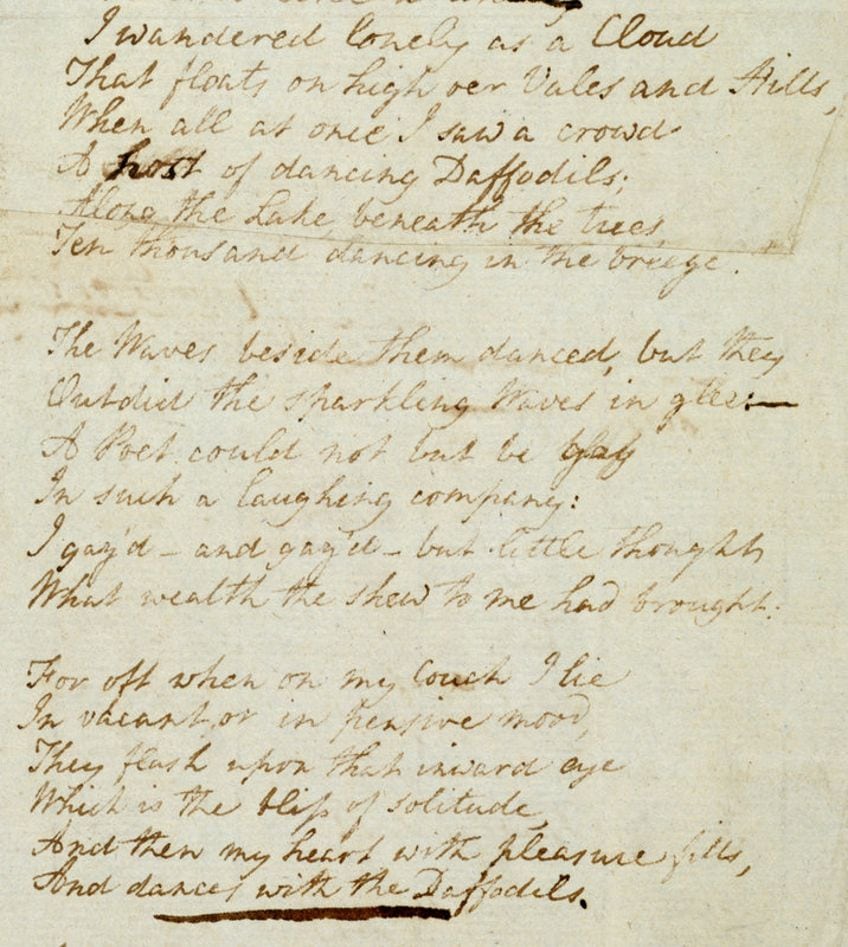
This poem, and its depiction of the natural world, is based on one of the walks that Wordsworth himself took while in the English countryside, and the central image of the poem, the daffodils, was present on that walk. They would have a major point of influence on Wordsworth later in his life. We are going to discuss a larger I Wandered Lonely as a Cloud analysis later in this article, but before we get to that point, we should first have a quick look at a summary of this text for those who may not have the time needed to get through the full analysis.
Summary of I Wandered Lonely as a Cloud by William Wordsworth
While it would be best to have a look at this analysis and discussion of I Wandered Lonely as a Cloud by William Wordsworth as a whole, there is not always the time for that.
So, for those who need a quick summary of the poem and some of the central concepts behind it, this should help:
- I Wandered Lonely as a Cloud is about the natural world. Like many Romantic poems, this one is an exploration of the natural world and the power found within it. The poem was inspired by a real walk that Wordsworth took when he was younger, and the image of daffodils that grew along his trail remained in his mind for years. This poem shows how these kinds of natural images can become embedded and become companions to us.
- I Wandered Lonely as a Cloud is an example of a lyric poem. Many of the poems that were written by the Romantics were concerned with emotions, and this poem is no different. As an example of a lyric poem, I Wandered Lonely as a Cloud by William Wordsworth wants to show us the feelings that can arise because of the natural world, and the effect that it has on us as a result.
- I Wandered Lonely as a Cloud did not achieve a good reception when it was first published. While this immensely famous Romantic poem has since become one of the best-known of all the Romantic poems, this was not always the case. It was, instead, a poem that received a rather harsh reception from critics at the time. Even fellow Romantic poets were often critical of it. It has weathered those criticisms to become one of the poems that typifies the Romantic movement.
Now that we have finished off our short summary of the poem and the analysis of it, we can move on with the rest of our discussion. We are going to start this discussion with a look at the man who wrote the poem in the first place.
Biography of William Wordsworth
William Wordsworth is generally perceived as one of the most consequential and influential English writers. He, along with Samuel Taylor Coleridge, are seen as the figures who helped to launch the Romantic Movement in English literature, and for that reason alone, he should be seen as an immensely influential and important figure. Many of the other famous Romantic authors may not have gotten their start had it not been for Wordsworth.
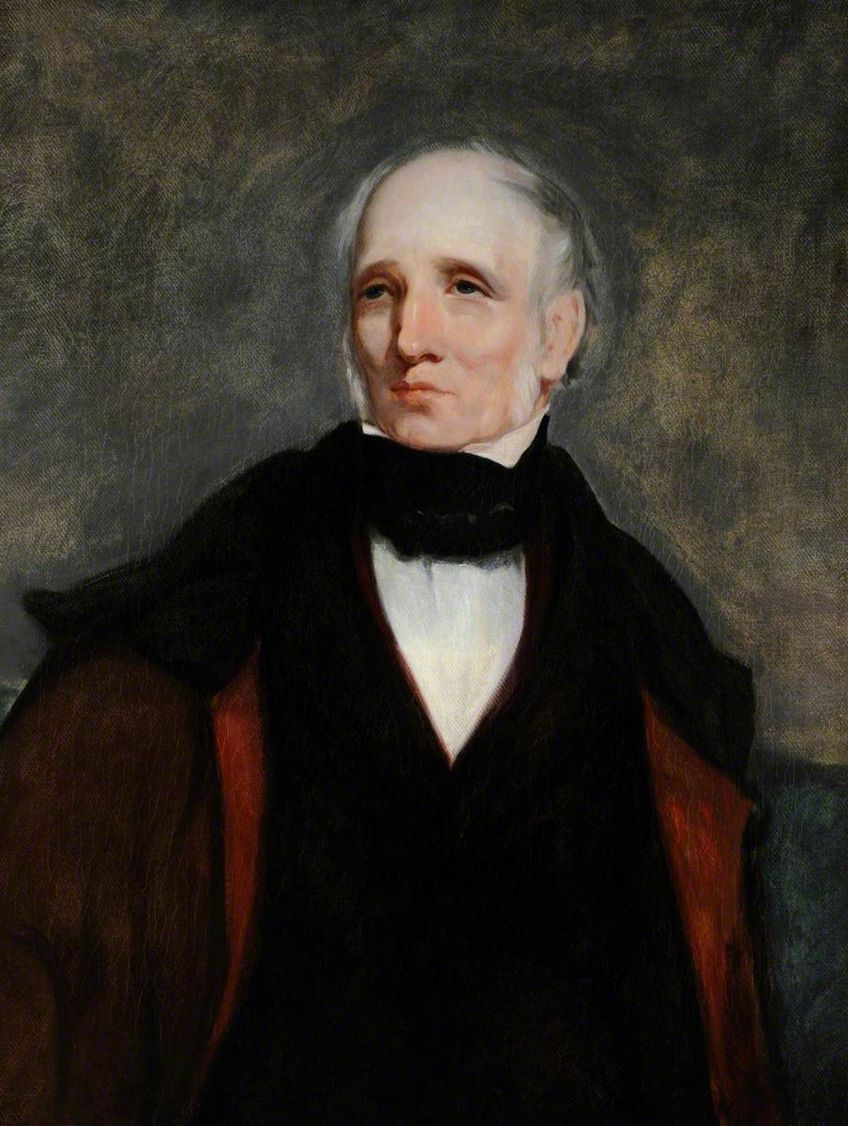
His work was often associated with the natural world and emotion. And while some of his poems, such as the one we are discussing today, took longer to be accepted by contemporaries, he was famous and influential in his lifetime. For instance, in 1843, he would become the Poet Laureate of England. He held onto this position until his death. The influence that Wordsworth exerted on English literature is one that cannot be understated.
An In-Depth I Wandered Lonely as a Cloud Analysis
I Wandered Lonely as a Cloud by William Wordsworth is a lyric poem and one of the best-known Romantic poems ever written. Over the course of this analysis, you may understand why this is the case. It is often seen as a typification of the movement’s usual goals and themes. However, before we dive into the content of the poem, what about the formal features? This poem is comprised of four sestet stanzas. This means that each of the stanzas has six lines. Each of these stanzas includes the same rhyme scheme. This rhyme scheme is laid out as ABABCC.
So, each stanza includes a quatrain of alternating rhyme, but it also makes use of a couplet rhyme at the end.
As for the metrical structure that is used in I Wandered Lonely as a Cloud by William Wordsworth, it is made up of iambic tetrameter lines. This means that each of the lines is made up of eight syllables, and each of those syllables is arranged in unstressed-stressed pairs. There are four of these pairs, and that makes the total number of syllables per line. These are the basic formal elements of the poem in question, but it is now time for us to dive into our proper in-depth I Wandered Lonely as a Cloud analysis that goes line-by-line and stanza-by-stanza.
I wandered lonely as a cloud
That floats on high o’er vales and hills,
When all at once I saw a crowd,
A host, of golden daffodils;
Beside the lake, beneath the trees,
Fluttering and dancing in the breeze.
We open with one of the most famous of all lines in all of Romantic poetry. It is also the title of the text. This particular line makes use of first-person narration, and so we know that this is from the specific experience of a speaker, and they have used a simile in their very first thought. This simile involves wandering like a cloud.
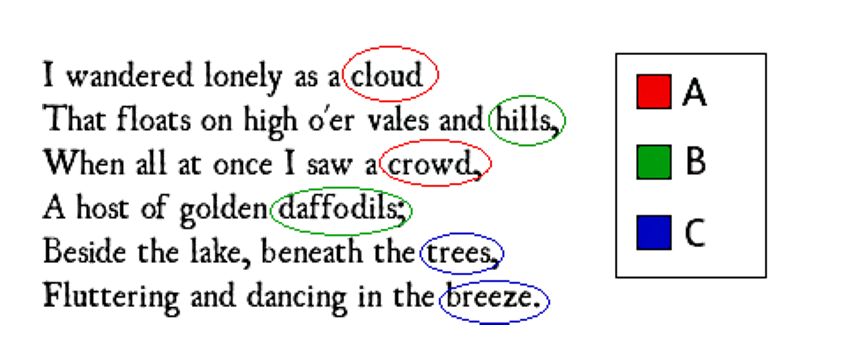
The implication of this is one of calm movement through the world. It also has a certain level of peacefulness and naturalness to it. A cloud does not move with any particular kind of purpose and instead moves through the sky as carried along by the wind. The speaker is attempting to create a direct connection with the natural world by being as the clouds above us all.
The second line simply reinforces the cloud idea, but the third and fourth lines introduce us to a major element of the poem. These two lines present us with the image of daffodils. There is a field of them, although they are personified as a “crowd” of daffodils. The next line simply states their position beside a lake and under some trees, but these serve to anchor the image of the daffodils in a particular setting. We have been introduced to this natural landscape within the first stanza, and the final line continues the use of personification to describe these daffodils as they are “dancing” in the wind.
The fixation on these daffodils for four of the six lines in this stanza should immediately indicate their significance to the message that the poem is attempting to convey to us.
Continuous as the stars that shine
And twinkle on the milky way,
They stretched in never-ending line
Along the margin of a bay:
Ten thousand saw I at a glance,
Tossing their heads in sprightly dance.
This stanza remains affixed to the image of the field of daffodils. They are compared, in the first two lines, to stars and the galaxies above. They are seen as something that sparkles in the natural world and, by using this comparison, we can give these flowers a kind of mystical air about them. They are not simply flowers in this poem, but they have rather come to represent the natural world in a persistent way.

The next two lines are relatively simple in what it expresses to us as they state that the daffodils stretched out before the speaker in a “never-ending line”, and this does hold a comparison with the previous two lines. The galaxies above us are also never-ending, and they are a mysterious force that, especially at the time of the Romantics, is still unknowable in many ways.
The fourth line serves to place it in its setting once more. It simply states where the daffodils can be found, and it reminds us that they sit beside the lake. But the next line returns to the image of sheer, unending abundance by numbering the daffodils as ten thousand. This has been a repetitive reinforcement of the comparison between the stars above and the daffodils upon the earth.
The final line, once again, returns us to the personification of the daffodils as they are “tossing their heads” as they dance in the breeze.
This repetitive use of personification of these flowers also indicates the continuation of an idea. These daffodils are not simply flowers but are instead equated to beings that are present as the speaker stands before them. They are not simply inanimate objects, but a thing that is also living beside him.
Stanza Three
The waves beside them danced; but they
Out-did the sparkling waves in glee:
A poet could not but be gay,
In such a jocund company:
I gazed—and gazed—but little thought
What wealth the show to me had brought:
The first two lines of the third stanza jump back to the lake beside the daffodils. We have been continuously reminded about the existence of this lake, and so it is reaffirmed here. There is also a comparison made between the dancing daffodils and the waves on the large lake because they too are dancing. And, much like the daffodils, they also sparkle. The comparison between the galaxies above us and the daffodils has been transferred to the waves.

The next two lines jump back to the speaker. He refers to himself in the third person and states that a poet should be happy to be in such company. This is where the personification of the daffodils and then, by association, the lake beside it becomes of paramount importance. The natural world around the speaker is not simply a detached landscape, but rather a kind of person who stands beside the speaker as he journeys through this world.
The final two lines of the stanza reinforce the idea of the speaker gazing upon this natural sight. These final lines will become pertinent in the final stanza as he thinks that this natural landscape is simply that. He did not think that it would bring him all that much joy in his life and so he moved on.
He did not remain for all that long, but this image would become something that remained in his memory.
Stanza Four
For oft, when on my couch I lie
In vacant or in pensive mood,
They flash upon that inward eye
Which is the bliss of solitude;
And then my heart with pleasure fills,
And dances with the daffodils.
The final stanza of I Wandered Lonely as a Cloud by William Wordsworth opens with the speaker far from that beautiful natural landscape. Instead, the poet sits on his couch. He has nothing to do and then remembers. He remembers the wondrous solitude of that walk through the countryside, and he remembers the daffodils. Upon remembering it, his “heart with pleasure fills”.

The poem wants to provide us with the idea of memory being a thing of note to us as humans. Our memories, even when we have departed from the beautiful and wondrous things that we have seen and experienced in our lives, we can still remember those things. If we saw those dancing daffodils as the speaker did, we may just be filled with joy at the mental image of them years upon years later. And that has been our I Wandered Lonely as a Cloud analysis.
The Themes of I Wandered Lonely as a Cloud by William Wordsworth
When it comes to the themes of I Wandered Lonely as a Cloud by William Wordsworth, we have to look toward the natural world. This is the primary source of imagery that this poem presents to us. It wants us to see the natural world, such as the images of the lake and the daffodils, and the immense power that can be found in such a beautiful sight. Furthermore, the poem wants us to see a certain level of companionship with the natural world. The speaker is at first alone, but they soon realize that they are not entirely alone.
Furthermore, the images that the natural world provides to the speaker are those images that can be recalled far later in his life.
And so the persistent endurance of memory is another of the themes that I Wandered Lonely as a Cloud by William Wordsworth explores. Like many Romantic poems about the natural world, it also holds a certain sense of celebration. The natural world is one that the Romantics preferred over the urbanization that was occurring at the time and, as such, the natural world is posited as a force for healing. It is a place where humanity can recover from what it is experiencing with the rise of the city and the decline of nature.
The Changing of Critical Reception to I Wandered Lonely as a Cloud Over Time
It can be strange for us to think now, thanks to the ubiquity of this poem when it comes to any collection of Romantic poetry, to think that it was universally acclaimed when it was released. But this wasn’t the case with this text. Instead, when I Wandered Lonely as a Cloud by William Wordsworth was first published, it, and the collection of which it was a part, was very poorly received.
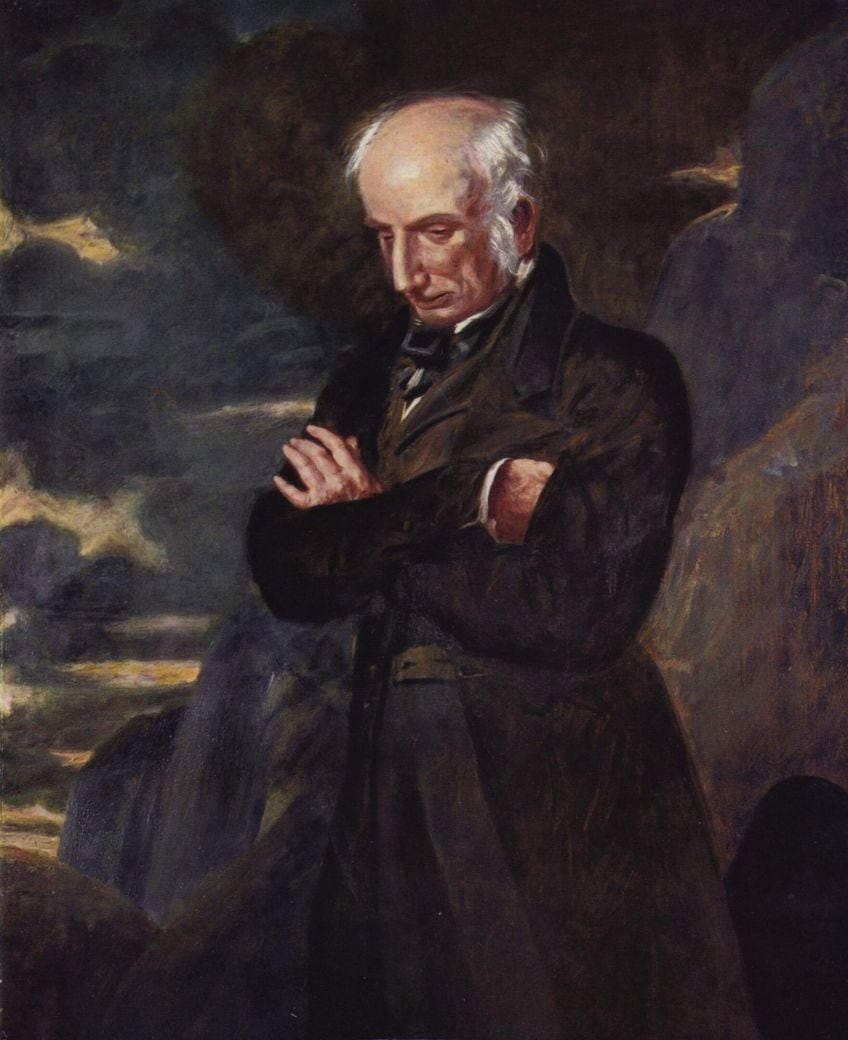
Even Lord Byron gave a negative review, and Wordsworth actively tried to influence how some outlets reviewed the work, but to little avail. However, the collection, and this poem, started to gain traction a few years after publication and public opinion eventually won out over the critical reception of the period. In the decades after it was released, it would come to be seen as one of the greatest examples of Romantic poetry. This is a reputation it has upheld to this day, and so the negative reception did not last. However, it can appear strange that this was the case when the poem was first released to the public.
With these final points about our I Wandered Lonely as a Cloud analysis and discussion, we have reached the conclusion. Today, we discussed this poem alongside the poet who wrote it, some of its central themes, and the changing of its critical reception over time. I Wandered Lonely as a Cloud by William Wordsworth is one of the best-known and most beloved of all the Romantic poems, but Wordsworth did write many other poems that are also worth a read!
Frequently Asked Questions
What is i wandered lonely as a cloud by william wordsworth.
This is a poem by the influential Romantic poet, William Wordsworth. It is a poem that explores a walk through the countryside in which a field of daffodils plays a central role. The poem was also inspired by a real walk that Wordsworth once took, and the daffodils in question were present on that walk as they remained in his memory.
Who Was William Wordsworth?
William Wordsworth is one of the most important and influential Romantic poets. He, alongside Samuel Taylor Coleridge, are seen as the English-language founders of Romanticism. His work would come to be seen as some of the quintessential examples of Romantic poetry ever produced, and much of his work was characterized by a dedication to emotion and the natural world.
What Type of Poem Is I Wandered Lonely as a Cloud by William Wordsworth?
This is a lyric poem. This type of poetry is a very broad category that entails the use of emotion from a personal perspective. I Wandered Lonely as a Cloud by William Wordsworth is a great example of a lyric poem because it explores his thoughts and feelings as he interacts with the natural world.
What Are the Themes of I Wandered Lonely as a Cloud by William Wordsworth?
The central themes of this poem revolve around nature and memory. The natural world is seen as a companion to the speaker as he wanders through it, and the memory of the daffodils remains long after he has left them behind. These kinds of ideas are common in many examples of Romantic poetry, but they are expressed strongly in this poem and, as such, this poem has become one of the most influential examples of this style of Romantic poetry.
What Are Some of the Other Famous Poems by William Wordsworth?
William Wordsworth wrote many poems over his career, and many of them are considered to be some of the best in the Romantic era. Some of his best-known poems include She Dwelt among the Untrodden Ways (1798), Lucy Gray (1799), and The World Is Too Much with Us (1802). However, he wrote far more poems than the few that have been mentioned in this answer.

Justin van Huyssteen is a freelance writer, novelist, and academic originally from Cape Town, South Africa. At present, he has a bachelor’s degree in English and literary theory and an honor’s degree in literary theory. He is currently working towards his master’s degree in literary theory with a focus on animal studies, critical theory, and semiotics within literature. As a novelist and freelancer, he often writes under the pen name L.C. Lupus.
Justin’s preferred literary movements include modern and postmodern literature with literary fiction and genre fiction like sci-fi, post-apocalyptic, and horror being of particular interest. His academia extends to his interest in prose and narratology. He enjoys analyzing a variety of mediums through a literary lens, such as graphic novels, film, and video games.
Justin is working for artincontext.org as an author and content writer since 2022. He is responsible for all blog posts about architecture, literature and poetry.
Learn more about Justin van Huyssteen and the Art in Context Team .
Cite this Article
Justin, van Huyssteen, ““I Wandered Lonely as a Cloud” by William Wordsworth – Analysis.” Art in Context. December 1, 2023. URL: https://artincontext.org/i-wandered-lonely-as-a-cloud-by-william-wordsworth/
van Huyssteen, J. (2023, 1 December). “I Wandered Lonely as a Cloud” by William Wordsworth – Analysis. Art in Context. https://artincontext.org/i-wandered-lonely-as-a-cloud-by-william-wordsworth/
van Huyssteen, Justin. ““I Wandered Lonely as a Cloud” by William Wordsworth – Analysis.” Art in Context , December 1, 2023. https://artincontext.org/i-wandered-lonely-as-a-cloud-by-william-wordsworth/ .
Similar Posts

“Stopping by Woods On a Snowy Evening” Analysis – A Close Look
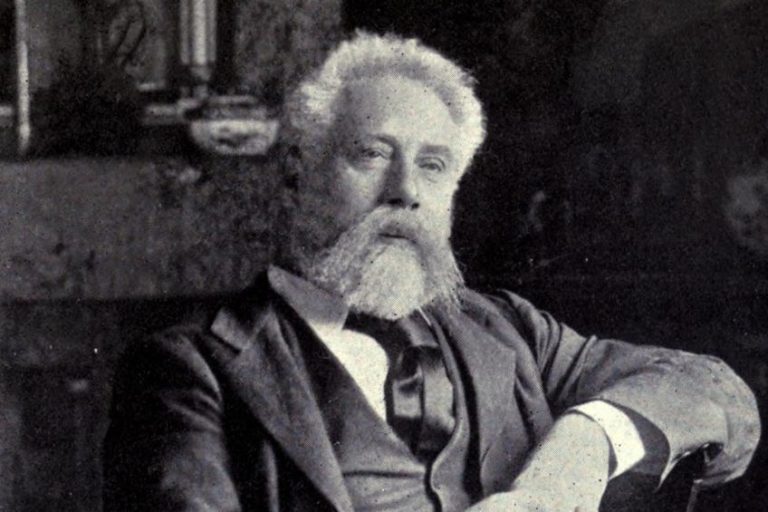
“Invictus” by William Ernest Henley – A Poetic Analysis

Famous Edgar Allan Poe Poems – The 10 Best Examples

Poems About Hope – Prose That Brings Light to Dark Places

“Harlem” by Langston Hughes Analysis – A Fresh Look at the Poem

Easy Poems to Analyze – A Beginners Guide to Poetry Analysis
Leave a reply cancel reply.
Your email address will not be published. Required fields are marked *
Save my name, email, and website in this browser for the next time I comment.

‘I Wandered Lonely as a Cloud’: Symbolism
By Dr Oliver Tearle (Loughborough University)
William Wordsworth’s classic poem beginning ‘I wandered lonely as a cloud’, which was first published in 1807, is a classic work of English Romanticism. Part of its power lies in the symbolism Wordsworth uses. Let’s take a closer look at some of the most important symbols from Wordsworth’s ‘daffodils poem’, as it is often known.
The memorable opening line to Wordsworth’s poem, ‘I wandered lonely as a cloud’, immediately helps us to situate the poem within the Romantic movement. Solitude and walking among nature were common features of Romanticism, and feature heavily in the work of the Romantic poets.
Indeed, it was estimated that Wordsworth walked some 180,000 miles during his lifetime. That’s perhaps 3,000 miles a year throughout his adult life, or nearly ten miles a day! So Wordsworth did a lot of wandering.
Why a cloud, though? A cloud floating high above the land symbolises two things, and imparts two details of Wordsworth’s solitude. First, he is not just on his own, but far from any other human being. A cloud floating far above the ground is similarly removed from all human life.
Second, the cloud is floating . This denotes a lack of agency, an aimlessness or a lack of purpose. When we combine this with the fact that Wordsworth describes himself as ‘lonely’, we have a picture of someone who is feeling low as well as lonely: he has lost direction and purpose.
Of course, describing himself as ‘lonely as a cloud’ brings in a simile , which is also an example of pathetic fallacy , because clouds cannot feel loneliness. Wordsworth attributes his own loneliness to the cloud.
I wandered lonely as a cloud That floats on high o’er vales and hills
This is when he encounters the ‘crowd’ of daffodils – and the daffodils introduce the next major symbol into the poem.
Continuous as the stars that shine And twinkle on the milky way
Here we have another simile: the long line or ‘crowd’ (or ‘host’) of daffodils Wordsworth sees puts him in mind of a continuous or unbroken array of stars shining in the night sky. The ‘milky way’ is, of course, our own galaxy.
This simile is perhaps the most surprising in the poem. Daffodils are yellow rather than white or silver in colour, so they don’t readily suggest ‘stars’ to us. But the star-comparison makes the daffodils appear almost (literally) otherworldly, as though they are part of the heavens rather than of the earthly realm.
There is a sense of the order of things, which isn’t always the case in Romantic poetry (which often liked to stress the natural dis order or disarray of the natural world, in contrast to the earlier eighteenth-century Augustan poetry, which preferred to see nature as an orderly thing).
The Daffodils Themselves.
Of course, the most important symbol in Wordsworth’s ‘daffodils’ poem is the symbol of the daffodils themselves. The daffodils are, of course, literal, and Wordsworth really did see them (in 1802; although he was actually not alone, never mind ‘lonely’, but with his sister, Dorothy ).
We’ve already seen that Wordsworth compared the ‘crowd’ of daffodils to the ‘stars that shine’ in the night sky. But the daffodils’ own symbolism, what they represent to the poet, becomes clearest of all in the poem’s final stanza:
For oft, when on my couch I lie In vacant or in pensive mood, They flash upon that inward eye Which is the bliss of solitude; And then my heart with pleasure fills, And dances with the daffodils.
The daffodils symbolise not just all of nature, but man’s connection with nature . Romanticism is often lazily viewed as being synonymous with nature poetry, but what characterises much Romantic poetry is an emphasis on the transformative power of nature for the observer.
So Wordsworth’s mood is entirely transformed when he sees the daffodils. They lift him out of his melancholy and loneliness (and self-pity?), and remind him that we are never truly alone, even if we are far from other humans, when we have nature nearby.
But it’s more than this. Wordsworth is still aware that he is literally alone (that is, he is without human company). But he no longer views solitude as synonyms with loneliness. Note his use of the phrase ‘the bliss of solitude’ in that final stanza quoted above. Being on one’s own can be a good thing when one has the memory of nature and its beauty and purity to recollect and think about.
And once he has witnessed those daffodils just once, they are, as it were, ‘on tap’, there for him to gain pleasure from whenever he chooses to remember them in his mind’s eye.
With this in mind, we might conclude that the greatest quality which the daffodils symbolise in ‘I Wandered Lonely as a Cloud’ is happiness itself. The daffodils themselves seem happy as they dance in that breeze. This joyousness (which is another example of personification ) is infectious, since the poet himself realises he cannot choose but to be happy in such ‘jocund [i.e., jolly] company’.
Dancing often symbolises happiness, so note that the word recurs in the poem, appearing in the opening stanza (‘Fluttering and dancing in the breeze’) where it refers to the daffodils only before returning in the final stanza (‘My heart at once with pleasure fills, / And dances with the daffodils’), where the daffodils have recruited the poet as their dance partner, we might say, and the two of them dance together in his mind’s eye.
<script id=”mcjs”>!function(c,h,i,m,p){m=c.createElement(h),p=c.getElementsByTagName(h)[0],m.async=1,m.src=i,p.parentNode.insertBefore(m,p)}(document,”script”,”https://chimpstatic.com/mcjs-connected/js/users/af4361760bc02ab0eff6e60b8/c34d55e4130dd898cc3b7c759.js”);</script>
Discover more from Interesting Literature
Subscribe now to keep reading and get access to the full archive.
Continue reading
- Older Adults
- Professionals
- Explore NCOA.org
- Get Involved
- Best Hearing Aids
- Best OTC Hearing Aids
- Most Affordable Hearing Aids
- Best Medical Alert Systems
- Best Fall Detection Devices
- Life Alert Review
- Best Portable Oxygen Concentrator
- Best Mattress
- Best Mattress for Back Pain
- Best Adjustable Beds
- Best Walk-In Tubs
Find us on Social
The NCOA Adviser Reviews Team researches these products & services and may earn a commission from qualified purchases made through links included.
The NCOA Adviser Reviews Team researches these products & services and may earn a commission from qualified purchases made through links included. NCOA does not receive a commission for purchases. If you find these resources useful, consider donating to NCOA .
Understanding Wandering Risks With Older Adults
Key takeaways.
- Approximately 36% of people with dementia will wander.
- The top dangers for people who wander include injuries, dehydration, harsh weather exposure, medical complications, drowning, or being hit by a car.
- Understanding and planning for wandering is vital in caring for someone with dementia.
For many of us, staying at home as we age , also known as aging in place, is ideal. In fact, a recent survey shows 90% of adults [1] Gavin, Kara. Michigan News. Most Older Adults Want to ‘Age in Place’ But Many Haven’t Taken Steps to Help Them Do So. April 13, 2022. Found on the internet at https://news.umich.edu/most-older-adults-want-to-age-in-place-but-many-havent-taken-steps-to-help-them-do-so 50 and over say they want to age in place . [2] National Institutes of Health (NIH). Aging in Place: Growing Older at Home. May 1, 2017. Found on the internet at https://www.nia.nih.gov/health/aging-place-growing-older-home But home safety is critical, and for older adults with cognitive decline, wandering is a safety concern you should consider.
Wandering , also known as elopement, is “when someone leaves a safe area or responsible caregiver” and can occur inside or outside the home. [3] Centers for Disease Control and Prevention (CDC). Disability and Safety: Information on Wandering (Elopement). Sept. 18, 2019. Found on the internet at https://www.cdc.gov/ncbddd/disabilityandsafety/wandering.html People who wander may not be aware of their safety, which puts them at risk of getting lost, falling, or other accidents with injuries.
“Aging in place can be feasible for some older adults with dementia,” said Sean Marchese , a registered nurse at the Orlando, Florida-based Mesothelioma Center with more than 20 years of direct patient care. “Depending on individual circumstances, familiar surroundings, caregiver support, and dependable routines can reduce the risks of wandering and elopement. Another essential aspect is emotional well-being. A fulfilling environment is crucial to safely aging in place.”
In this guide, we discuss safety precautions to prevent wandering for caretakers whose care recipients are aging in place.
What is wandering risk, and who does it impact?
The risk of wandering is common among people with dementia, including Alzheimer’s disease. According to the Alzheimer’s Association, six in 10 people with dementia will wander at least once. [5] Alzheimer’s Association. Causes and Risk Factors for Alzheimer’s Disease. Found on the internet at https://www.alz.org/alzheimers-dementia/what-is-alzheimers/causes-and-risk-factors Caregivers should be aware of this potential safety risk. Wandering can occur when people are:
- At home or alone in public: Those who live alone can wander away from home while shopping or completing errands. If accessible, your care recipient may use a car or other means of transportation to wander off.
- At home or in public with others: People can wander from their homes or while shopping unnoticed, even with family or friends.
Why does wandering happen?
Risk factors for wandering include cognitive impairment, restlessness, agitation, previous wandering attempts, and expressions of a desire to leave. [6] MeetCaregivers. Elopement and Wandering in Seniors. June 27, 2022. Found on the internet at https://meetcaregivers.com/dementia-wandering-prevention-management Wandering off may be intentional or unintentional due to confusion or loss of memory. [7] The Helper Bees. Wandering and Elopement: A Brief Guide. Viewed Aug. 19, 2023. Found on the internet at https://www.thehelperbees.com/families/healthy-hive/wandering-and-elopement-a-brief-guide Intentional incidents may occur when people feel they need to be somewhere, have something to do, or seek something they need. Some common triggers include changes in medication, changes in environment, and feeling overwhelmed.
What are the risks of wandering?
“Older adults with dementia face several risks from wandering and elopement,” said Marchese. “Memory loss, confusion, disorientation, and other impairments can lead to physical harm and forgotten surroundings without a plan of returning home. In some cases, restlessness and communication challenges can exacerbate these issues.”
A review of 325 U.S. newspaper articles describing incidents with people with dementia (PWD) found 40% of PWD who went missing were found dead the next day. [8] BMC Geriatrics. Persons With Dementia Missing in the Community: Is It Wandering or Something Unique? June 5, 2011. Found on the internet at https://bmcgeriatr.biomedcentral.com/articles/10.1186/1471-2318-11-28 This statistic emphasizes the importance of recognizing the dangers older adults may face after wandering. These dangers include injuries, dehydration, harsh weather exposure, medical complications, drowning, or being hit by a car. [9] ECRI Institute. Continuing Care Risk Management: Wandering and Elopement. April 2014. Found on the internet at https://alnursing.org/wp-content/uploads/2020/03/WanderingandElopementPacket.pdf And experiencing these dangers could impact the mental and emotional well-being of the older adult and their caregivers.
Physical dangers of wandering
- Exposure to extremes in hot or cold weather can be deadly for someone who has wandered from their safe environment.
- Hurricane exposure increases the risk of death for people with dementia. [10] University of Michigan News. Risk of Death for People With Dementia Increases After a Hurricane Exposure. March 13, 2023. Found on the internet at https://news.umich.edu/risk-of-death-for-people-with-dementia-increases-after-a-hurricane-exposure The confusion and disruption of living conditions in the aftermath may lead to wandering.
- Annually, roughly 300 older adults die from drowning . Wandering may result in encounters with bodies of water when lost, like lakes or rivers. Some drowning also occurs in swimming pools that people may encounter while wandering.
- People who wander may feel they know where they are going , but their cognitive state can lead them to become lost. [11] Sundara Living. Elopement in Dementia. What do I do? July 26, 2021. Found on the internet at https://sundaraliving.com/living-with-dementia/elopement-in-dementia-what-do-i-do
- Falls may occur after a person has wandered away from home. Being in unfamiliar surroundings, medication effects, difficulty walking, and weakness are some contributing factors for older adults who fall . [12] Centers for Disease Control and Prevention (CDC). Facts About Falls. May 12, 2023. Found on the internet at https://www.cdc.gov/falls/facts.html These falls may lead to serious injuries, like head injuries or broken bones.
In the focused review of 325 U.S. newspapers cited above, 74 articles noted that driving was a factor when the person went missing. Of these incidents, 80% drove with their caregiver’s knowledge, and 11% drove without their knowledge. [8] BMC Geriatrics. Persons With Dementia Missing in the Community: Is It Wandering or Something Unique? June 5, 2011. Found on the internet at https://bmcgeriatr.biomedcentral.com/articles/10.1186/1471-2318-11-28 Results included missing-driver incidents, head-on collisions, and wrong-way driving. Studies have shown older drivers with cognitive impairment have an increased risk of motor vehicle crashes (MVC). Driving too slowly and taking too long turning left at intersections are two big reasons for MVCs in older people . [13] Dementia & Neuropsychologia. Cognitive Impairment and Driving: A Review of the Literature. October 2009. Found on the internet at: https://www.ncbi.nlm.nih.gov/pmc/articles/PMC5619413
Common wandering warning signs
People with dementia often wander, and it’s estimated that 36% of those diagnosed with Alzheimer’s and living in a community will wander. For people who consistently wander, an estimated 80% will leave their area. [9] ECRI Institute. Continuing Care Risk Management: Wandering and Elopement. April 2014. Found on the internet at https://alnursing.org/wp-content/uploads/2020/03/WanderingandElopementPacket.pdf It’s important to note that allowing people to walk around their environment will not necessarily lead to wandering. Walking has many benefits, including relieving stress and boredom. [11] Sundara Living. Elopement in Dementia. What Do I Do? July 26, 2021. Found on the internet at https://sundaraliving.com/living-with-dementia/elopement-in-dementia-what-do-i-do
Caregivers should learn to recognize the signs and symptoms that may lead to a wandering incident. These include people who: [6] MeetCaregivers. Elopement and Wandering in Seniors. June 27, 2022. Found on the internet at https://meetcaregivers.com/dementia-wandering-prevention-management [11] Sundara Living. Elopement in Dementia. What Do I Do? July 26, 2021. Found on the internet at https://sundaraliving.com/living-with-dementia/elopement-in-dementia-what-do-i-do [7] The Helper Bees. Wandering and Elopement: A Brief Guide. Viewed Aug. 19, 2023. Found on the internet at https://www.thehelperbees.com/families/healthy-hive/wandering-and-elopement-a-brief-guide
- Have a cognitive impairment diagnosis or cognitive decline
- Become agitated or restless
- Make efforts to open doors leading to other areas or outside
- Have wandered or have left home in the past
- Express a desire to leave their current location (making statements they need to go to work or home)
- Are gone for extended periods when walking or participating in other activities
- Have difficulty finding familiar places in the home
- Become anxious when in crowds, like at a shopping center
- Look for keys, coats, purses, or other items that may reflect an attempt to leave
- Frequently search for missing people or lost items
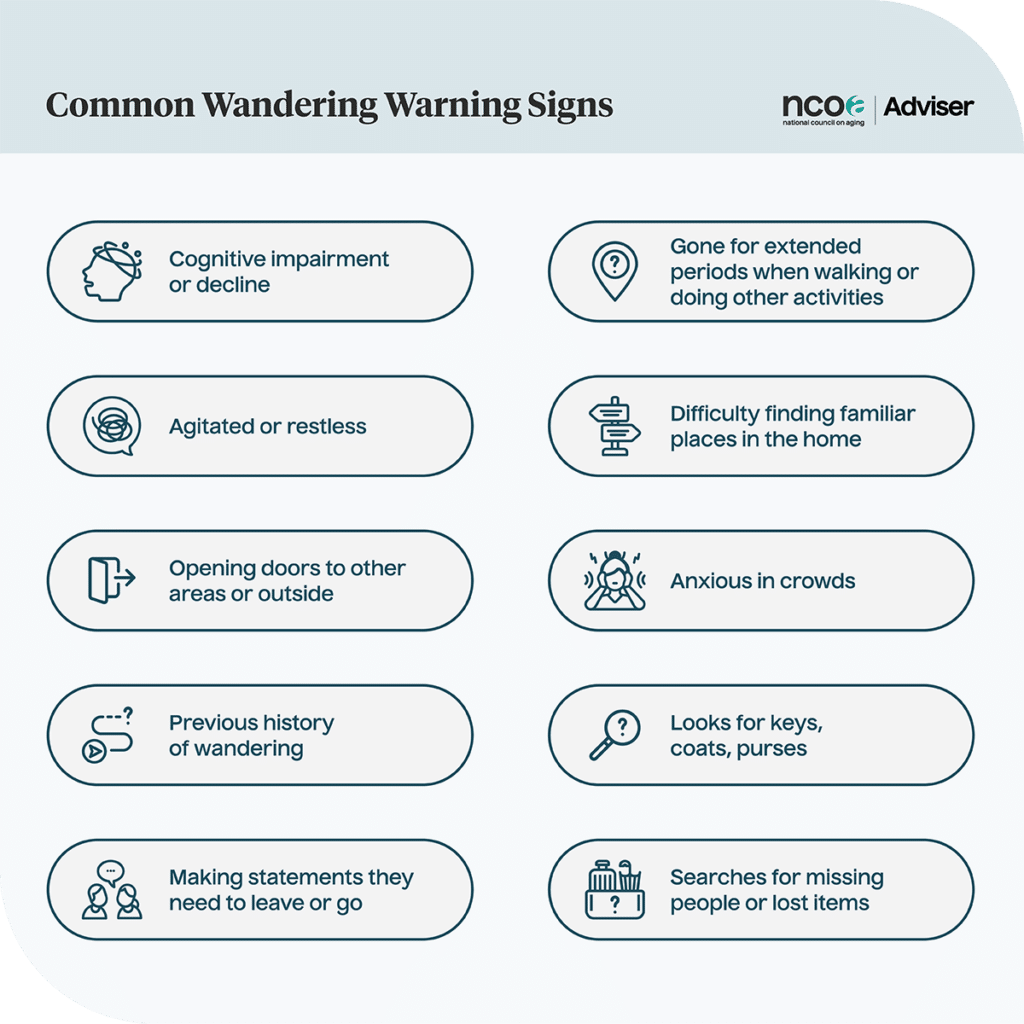
What caregivers can do about wandering
The Joint Commission International considers wandering a sentinel event , which is an event that can result in temporary, severe, or permanent harm or death. [14] The Joint Commission. Sentinel Event. Viewed Aug. 20, 2023. Found on the internet at https://www.jointcommission.org/resources/sentinel-event Maintaining a safe environment can help prevent wandering and injury.
According to the Alzheimer’s Association, as the disease progresses, you can make your home safer with tactics that include making doors the same color as walls to camouflage them, installing monitoring devices above doors to detect when they’re opened, installing or planting fences or hedges around patios and yards, and creating indoor areas that are safe to explore. [4] Alzheimer’s Association. Wandering. Found on the internet at https://www.alz.org/help-support/caregiving/stages-behaviors/wandering
Conduct a wandering risk assessment
A wandering risk assessment evaluates a person’s condition and likelihood of wandering. Several tools can help determine an older adult’s risk of wandering, including the Rating Scale for Aggressive Behavior in the Elderly (RAGE) and the Neuropsychiatric Inventory (NPI), which measures dementia-related behavioral symptoms . [15] American Psychological Association. Neuropsychiatric Inventory. 2011. Foud on the internet at https://www.apa.org/pi/about/publications/caregivers/practice-settings/assessment/tools/neuropsychiatric-inventory
Consider having a risk assessment done by a health provider, so you can be fully prepared for a wandering incident while someone is in your care.
If you’re unsure if a professional assessment is needed, conducting a basic at-home assessment of your care recipient’s habits can help determine if they may be at risk for wandering behavior. Ask yourself questions, like: [6] MeetCaregivers. Elopement and Wandering in Seniors. June 27, 2022. Found on the internet at https://meetcaregivers.com/dementia-wandering-prevention-management [16] Agency for Healthcare Research and Quality (AHRQ). Elopement. Dec. 1, 2007. Found on the internet at https://psnet.ahrq.gov/web-mm/elopement
- How frequently has your care recipient wandered?
- When was the first time your care recipient wandered?
- Do they tend to wander more during the day or night?
- Are common triggers noise or discomfort?
- When your care recipient wanders, is it random, or does it happen at regular intervals?
- Can you identify a motivation for when your care recipient wanders?
- Does your care recipient have a court-appointed legal guardian?
- Is your care recipient dangerous to you or others?
- Has cognitive decline impacted your care recipient’s ability to make decisions?
These questions are excellent for caregivers to be familiar with, so they’re not caught (completely) off-guard if an incident occurs. Answering these questions may provide a reliable assessment of wandering risk. Once you complete this assessment, it should assist in determining if further assessment is needed.
Check out our Wandering Risk Assessment
Unable to display PDF file.
Understand triggers
Recognizing the behaviors or events that may lead to wandering is one of the most critical factors caregivers need to prevent this from occurring. Examples of potential triggers for missing incidents include: [9] ECRI Institute. Continuing Care Risk Management: Wandering and Elopement. April 2014. Found on the internet at https://alnursing.org/wp-content/uploads/2020/03/WanderingandElopementPacket.pdf [6] MeetCaregivers. Elopement and Wandering in Seniors. June 27, 2022. Found on the internet at https://meetcaregivers.com/dementia-wandering-prevention-management
- Disorientation from the current location, going off in the wrong direction, and the inability to reorient due to dementia. People may not be able to self-correct, particularly in the later stages of the disease, but someone else with the right approach can often reorient them
- Experiencing feelings of hunger, pain, boredom, anxiety, or urge to use the bathroom
- Exposure to high-traffic areas
- Being near stairwells and elevators, which may prompt them to try to exit the area
- Easily locating suitcases, outdoor clothing, or other items associated with leaving their current location or taking a trip
- Exposure to noise, discomfort, or other distress
Understanding their habits and usual activity time frames can help you be more aware of when their triggers may occur. Watch your care recipient for signs of hunger, boredom, and anxiety, and act quickly when triggered. Be sure to keep your care recipient in an area with easy access to the bathroom and other frequently visited rooms to reduce their risk of wandering. Store suitcases, outdoor clothing, or other travel items, like keys, wallets, and handbags, in an area not usually accessible to your care recipient.
Take preventive steps
Avoiding wandering is crucial to prevent serious injury or death. Some suggestions for prevention include: [9] ECRI Institute. Continuing Care Risk Management: Wandering and Elopement. April 2014. Found on the internet at https://alnursing.org/wp-content/uploads/2020/03/WanderingandElopementPacket.pdf [6] MeetCaregivers. Elopement and Wandering in Seniors. June 27, 2022. Found on the internet at https://meetcaregivers.com/dementia-wandering-prevention-management [17] Sparks, Dana. Mayo Clinic. Alzheimer’s and Dementia: Understand Wandering and How to Address it. Nov. 30, 2020. Found on the internet at https://newsnetwork.mayoclinic.org/discussion/alzheimers-and-dementia-understand-wandering-and-how-to-address-it [4] Alzheimer’s Association. Wandering. Found on the internet at https://www.alz.org/help-support/caregiving/stages-behaviors/wandering
- Use a medical alert system that includes GPS tracking . Many new systems available on the market today have wearable GPS devices for older adults in the form of necklaces or smartwatches .
- If there is a risk of wandering by using a car, storing the keys in a location unknown to your care recipient may be beneficial. You can also track someone if wandering occurs in a vehicle using a GPS locator system, like OnStar’s Guardian or Safepoint.
- Provide a stimulating environment. Instances of wandering can begin with the person feeling bored. Keep an eye on your care recipient to prevent overstimulation, which can also trigger wandering.
- Create a safe space where your care recipient may wander without the risk of leaving. Gardens, walking paths, or outdoor lounge areas may serve this purpose.
- Create a schedule of daily activities for your care recipient. Participating in these activities may help them feel a sense of purpose and can prevent boredom.
- Use alarm systems and locks to prevent wandering away from the home.
Make a plan ahead of time
Readying a plan of action can help you find your care recipient sooner. Making sure recent photographs are available can assist authorities in searching for your care recipient, and ensuring they are wearing a medical ID bracelet can help with identification while providing crucial medical information in an emergency. These can be obtained through the Alzheimer’s Association or are available through stores, like Amazon. Additional considerations include: [4] Alzheimer’s Association. Wandering. Found on the internet at https://www.alz.org/help-support/caregiving/stages-behaviors/wandering [18] Alzheimer’s Society. Supporting a Person With Dementia Who Walks About. Found on the internet at https://www.alzheimers.org.uk/about-dementia/symptoms-and-diagnosis/supporting-person-dementia-who-walks-about [9] ECRI Institute. Continuing Care Risk Management: Wandering and Elopement. April 2014. Found on the internet at https://alnursing.org/wp-content/uploads/2020/03/WanderingandElopementPacket.pdf
- Secure a case number from the police if your care recipient goes missing. Be sure to specify they are diagnosed with dementia or other cognitive deficits.
- Talk to anyone in the surrounding area where your care recipient was last seen to get information regarding their direction of travel.
- Request the police issue a Silver Alert (a public notification system broadcasting missing older adults with Alzheimer’s disease, dementia, or other cognitive decline) to media outlets and other police departments in the area.
- If your care recipient has a cellphone, contact the service provider and see if they can assist you in finding the phone’s location. Apps, like Find My iPhone or Life360 , can help you track your care recipient as long as they have their phone on them.
- Contact nearby hospitals and describe your missing care recipient, including any medical issues they have.
- Check locations your care recipient frequently visits. These locations may include their favorite restaurant or shopping center. Leave missing person signs in these locations if available.
- Maintain a list of up-to-date phone numbers for friends and family, so you can alert them if your care recipient is missing or inquire when they last saw them and where they were headed next.
Coping with wandering
When a care recipient wanders, friends and family may experience many emotional challenges, commonly including anxiety, pain, and grief. [19] Cake End-of-Life Planning. How to Cope When a Loved One is Missing: 11 Tips. May 2, 2022. Found on the internet at https://www.joincake.com/blog/grief-for-missing-persons
Here are five steps to cope with a missing care recipient: [19] Cake End-of-Life Planning. How to Cope When a Loved One is Missing: 11 Tips. May 2, 2022. Found on the internet at https://www.joincake.com/blog/grief-for-missing-persons
- Seek support from friends and family. Ask them to assist with the search or other tasks to help you.
- Take care of yourself physically and emotionally. Avoid isolation.
- Find ways to express your feelings. Denying yourself the expression of grief can cause damage to your physical and emotional health.
- Limit your exposure to news coverage. Ask a friend or family member to share the responsibility of monitoring the news to prevent you from becoming overwhelmed.
- Keep hope alive. Seek out grief or missing person support groups online.
Bottom line
People with dementia benefit from exercise and activity, but caregivers should also be aware of the risk their care recipient will wander.
About six in 10 people with dementia will wander at least once. [4] Alzheimer’s Association. Wandering. Found on the internet at https://www.alz.org/help-support/caregiving/stages-behaviors/wandering Wandering is common among people with dementia, including Alzheimer’s. Serious injury or death can occur when wandering leads to leaving a safe place.
Preventive measures may include monitoring for triggers, like looking for car keys or stating they need to leave for work or home. [6] MeetCaregivers. Elopement and Wandering in Seniors. June 27, 2022. Found on the internet at https://meetcaregivers.com/dementia-wandering-prevention-management Prior planning is essential for quick response and recovery if a care recipient leaves home.
Many options are available to help find your care recipient should they go missing. Modern technology has brought us medical alert systems with wearable GPS locators. Additional location assistance may be available through vehicle GPS services, like OnStar , which can help find people quickly and safely. Consequently, when wandering occurs, anxiety, pain, and grief are common for caregivers and clinicians, so emotional support is critical to helping you cope with these emotions. [19] Cake End-of-Life Planning. How to Cope When a Loved One is Missing: 11 Tips. May 2, 2022. Found on the internet at https://www.joincake.com/blog/grief-for-missing-persons
Have questions about this review? Email us at [email protected] .
- Gavin, Kara. University of Michigan News. Most Older Adults Want to ‘Age in Place’ But Many Haven’t Taken Steps to Help Them Do So. April 13, 2022. Found on the internet at https://news.umich.edu/most-older-adults-want-to-age-in-place-but-many-havent-taken-steps-to-help-them-do-s
- National Institutes of Health (NIH). Aging in Place: Growing Older at Home. May 1, 2017. Found on the internet at https://www.nia.nih.gov/health/aging-place-growing-older-home
- Centers for Disease Control and Prevention (CDC). Disability and Safety: Information on Wandering (Elopement). Sept. 18, 2019. Found on the internet at https://www.cdc.gov/ncbddd/disabilityandsafety/wandering.html
- Alzheimer’s Association. Wandering. Found on the internet at https://www.alz.org/help-support/caregiving/stages-behaviors/wandering
- Alzheimer’s Association. Causes and Risk Factors for Alzheimer’s Disease. Found on the internet at https://www.alz.org/alzheimers-dementia/what-is-alzheimers/causes-and-risk-factors
- MeetCaregivers. Elopement and Wandering in Seniors. June 27, 2022. Found on the internet at https://meetcaregivers.com/dementia-wandering-prevention-management
- The Helper Bees. Wandering and Elopement: A Brief Guide. Viewed Aug. 19, 2023. Found on the internet at https://www.thehelperbees.com/families/healthy-hive/wandering-and-elopement-a-brief-guide
- BMC Geriatrics. Persons With Dementia Missing in the Community: Is It Wandering or Something Unique? June 5, 2011. Found on the internet at https://bmcgeriatr.biomedcentral.com/articles/10.1186/1471-2318-11-28
- ECRI Institute. Continuing Care Risk Management: Wandering and Elopement. April 2014. Found on the internet at https://alnursing.org/wp-content/uploads/2020/03/WanderingandElopementPacket.pdf
- University of Michigan News. Risk of Death for People With Dementia Increases After a Hurricane Exposure. March 13, 2023. Found on the internet at https://news.umich.edu/risk-of-death-for-people-with-dementia-increases-after-a-hurricane-exposure
- Sundara Living. Elopement in Dementia. What Do I Do? July 26, 2021. Found on the internet at https://sundaraliving.com/living-with-dementia/elopement-in-dementia-what-do-i-do
- Centers for Disease Control and Prevention (CDC). Facts About Falls. May 12, 2023. Found on the internet at https://www.cdc.gov/falls/facts.html
- Dementia & Neuropsychologia. Cognitive Impairment and Driving: A Review of the Literature. October 2009. Found on the internet at: https://www.ncbi.nlm.nih.gov/pmc/articles/PMC5619413
- The Joint Commission. Sentinel Event. Viewed Aug. 20, 2023. Found on the internet at https://www.jointcommission.org/resources/sentinel-event
- American Psychological Association. Neuropsychiatric Inventory. 2011. Foud on the internet at https://www.apa.org/pi/about/publications/caregivers/practice-settings/assessment/tools/neuropsychiatric-inventory
- Agency for Healthcare Research and Quality (AHRQ). Elopement. Dec. 1, 2007. Found on the internet at https://psnet.ahrq.gov/web-mm/elopement
- Sparks, Dana. Mayo Clinic. Alzheimer’s and Dementia: Understand Wandering and How to Address it. Nov. 30, 2020. Found on the internet at https://newsnetwork.mayoclinic.org/discussion/alzheimers-and-dementia-understand-wandering-and-how-to-address-it
- Alzheimer’s Society. Supporting a Person With Dementia Who Walks About. Found on the internet at https://www.alzheimers.org.uk/about-dementia/symptoms-and-diagnosis/supporting-person-dementia-who-walks-about
- Cake End-of-Life Planning. How to Cope When a Loved One is Missing: 11 Tips. May 2, 2022. Found on the internet at https://www.joincake.com/blog/grief-for-missing-persons

Synonyms of wandering
- as in rambling
- as in nomadic
- as in roaming
- as in trespassing
- More from M-W
- To save this word, you'll need to log in. Log In
Thesaurus Definition of wandering
(Entry 1 of 2)
Synonyms & Similar Words
- digressionary
- digressional
Antonyms & Near Antonyms
- straightforward
- undeviating
- peripatetic
- galavanting
- on the move
- gallivanting
- perambulatory
Thesaurus Definition of wandering (Entry 2 of 2)
- knocking (about)
- gadding (about)
- kicking around
- vagabonding
- milling (about or around)
- trespassing
- transgressing
- breaking the law
- falling from grace
- backsliding
Thesaurus Entries Near wandering
wandering (into)
Cite this Entry
“Wandering.” Merriam-Webster.com Thesaurus , Merriam-Webster, https://www.merriam-webster.com/thesaurus/wandering. Accessed 21 Apr. 2024.
More from Merriam-Webster on wandering
Nglish: Translation of wandering for Spanish Speakers
Britannica English: Translation of wandering for Arabic Speakers
Subscribe to America's largest dictionary and get thousands more definitions and advanced search—ad free!

Can you solve 4 words at once?
Word of the day, noblesse oblige.
See Definitions and Examples »
Get Word of the Day daily email!
Popular in Grammar & Usage
Your vs. you're: how to use them correctly, every letter is silent, sometimes: a-z list of examples, more commonly mispronounced words, how to use em dashes (—), en dashes (–) , and hyphens (-), absent letters that are heard anyway, popular in wordplay, the words of the week - apr. 19, 10 words from taylor swift songs (merriam's version), a great big list of bread words, 10 scrabble words without any vowels, 12 more bird names that sound like insults (and sometimes are), games & quizzes.


IMAGES
VIDEO
COMMENTS
WANDER ALONE definition | Meaning, pronunciation, translations and examples
Definition: Wandering alone. A solitary adventurer who travels or wanders the globe. Not all those who wander are lost, but all those who wander alone are definitely solivagants. From the Latin word solivagus, meaning lonely or solitary, solivagant describes anyone who enjoys meandering around new countries, alone, in order to take it all in.
wandering: [adjective] characterized by aimless, slow, or pointless movement: such as. that winds or meanders. not keeping a rational or sensible course : vagrant. nomadic. having long runners or tendrils.
Definition - rambling alone : marked by solitary wandering. Solivagant also functions as a noun, with the meaning of "a solitary wanderer." The second portion of the word comes from the Latin vagus ("wandering"), a root it shares with noctivagant ("night-wandering") and gyrovague ("a wandering and usually dissolute monk of the early church").
a way of life that involves wandering alone, often without a permanent home or job. Example. He left his old life behind and embraced a solivagant lifestyle, traveling the world with nothing but a backpack. ... from Latin 'solus', meaning 'alone' + 'vagari', meaning 'to wander'
Wandering Alone synonyms - 25 Words and Phrases for Wandering Alone. meandering solo. exploring alone. roaming solo. journeying alone. loner. rambling alone. solivagant. travelling solo.
Mind wandering is believed to play an important role in generating new ideas, conclusions or insights (also known as "aha! moments"). This is because it can give your mind a break and free it ...
solivagant: [adjective] rambling alone : marked by solitary wandering.
WANDERING definition: 1. present participle of wander 2. to walk around slowly in a relaxed way or without any clear…. Learn more.
Wandering definition: moving from place to place without a fixed plan; roaming; rambling. See examples of WANDERING used in a sentence.
The people in the photos are alone but far from lonely. The photos they take are deliberate and not just taken by accident. We love the contagious sense of freedom that is emanating from the scenes. The views alone are delightful to see but it's really the emotion behind the shots that can make you want to give wandering alone a shot.
By William Wordsworth. I wandered lonely as a cloud. That floats on high o'er vales and hills, When all at once I saw a crowd, A host, of golden daffodils; Beside the lake, beneath the trees, Fluttering and dancing in the breeze. Continuous as the stars that shine. And twinkle on the milky way,
Word of the day. bummel. a stroll. WANDER ALONE meaning | Definition, pronunciation, translations and examples in American English.
Remember that the sentence and not the line is the unit of meaning in a poem. When you are reading a poem, pay attention to the punctuation, and discern the meaning of the complete sentence in poetry, not each individual line. ... Figurative Language. Wordsworth opens the poem by comparing the poet, wandering alone through the woods to a cloud ...
William Wordsworth's Romantic era poem "I Wandered Lonely as a Cloud" begins with that line, "I wandered lonely as a cloud." Wordsworth is literally talking about how he is walking through nature ...
Which is the bliss of solitude; And then my heart with pleasure fills, And dances with the daffodils. - William Wordsworth (1802) " I Wandered Lonely as a Cloud " (also sometimes called " Daffodils " [2]) is a lyric poem by William Wordsworth. [3] It is one of his most popular, and was inspired by a forest encounter on 15 April 1802 that ...
'I wandered lonely as a cloud That floats on high o'er vales and hills'. Wordsworth's poem is a quintessential example of Romanticism, a literary and artistic movement which emphasised a personal relationship with nature, among other things.Romantics were often wandering alone among nature, searching for solace or inspiration.
Key Takeaways. There is a significant difference between "wondering" and "wandering.". "Wondering" refers to a state of curiosity or inquiry, while "wandering" refers to physical movement without a specific destination or purpose. Using these words correctly is important to avoid confusion or miscommunication. Shawn Manaher.
An In-Depth I Wandered Lonely as a Cloud Analysis. I Wandered Lonely as a Cloud by William Wordsworth is a lyric poem and one of the best-known Romantic poems ever written. Over the course of this analysis, you may understand why this is the case. It is often seen as a typification of the movement's usual goals and themes.
Often known simply as 'Daffodils' or 'The Daffodils', William Wordsworth's lyric poem that begins 'I wandered lonely as a cloud' is, in many ways, the quintessential English Romantic poem. Its theme is the relationship between the individual and the natural world, though those daffodils are obviously the most memorable image from ...
The memorable opening line to Wordsworth's poem, 'I wandered lonely as a cloud', immediately helps us to situate the poem within the Romantic movement. Solitude and walking among nature were common features of Romanticism, and feature heavily in the work of the Romantic poets. Indeed, it was estimated that Wordsworth walked some 180,000 ...
This statistic emphasizes the importance of recognizing the dangers older adults may face after wandering. These dangers include injuries, dehydration, harsh weather exposure, medical complications, drowning, or being hit by a car. [9] And experiencing these dangers could impact the mental and emotional well-being of the older adult and their ...
Synonyms for WANDERING: rambling, leaping, excursive, indirect, discursive, meandering, maundering, desultory; Antonyms of WANDERING: consistent, logical, coherent ...